The Papers: Andrew faces Commons 'humiliation' and 'Mansion tax raid'

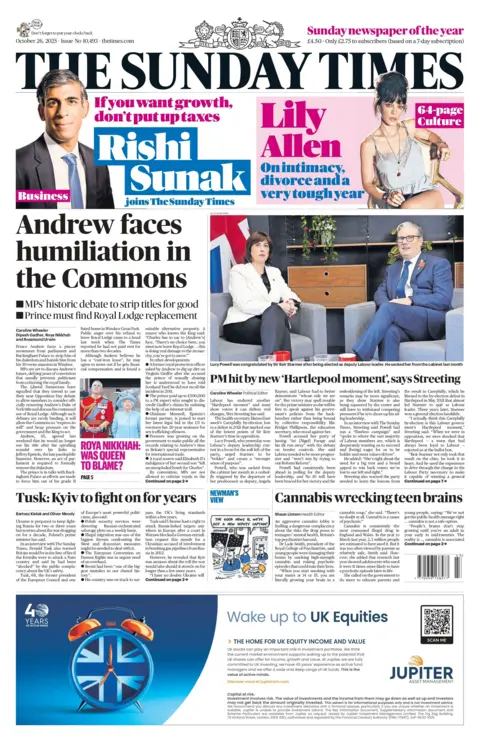

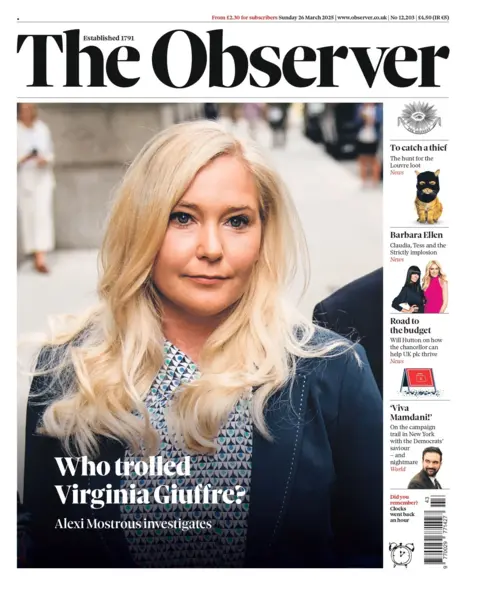



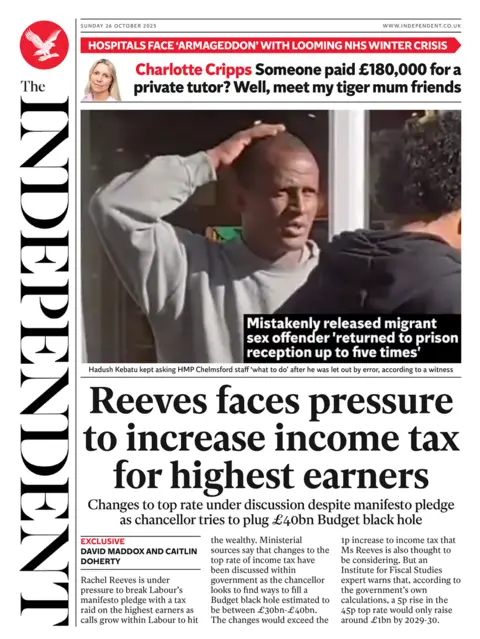

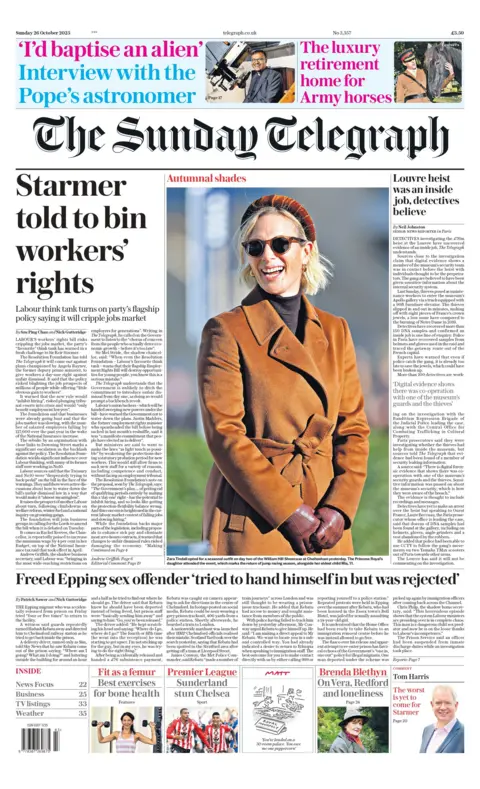

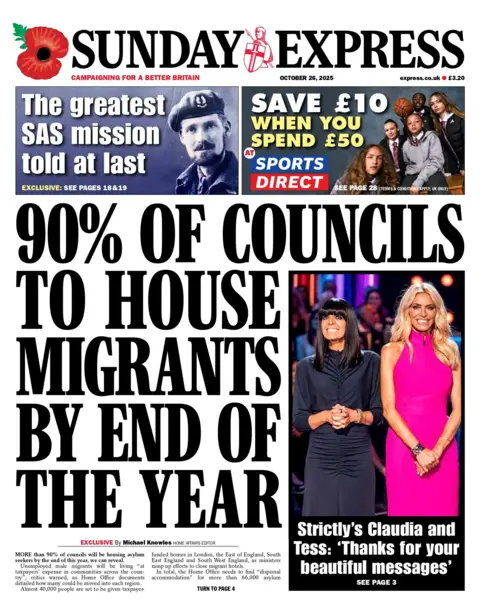








Sign up for our morning newsletter and get BBC News in your inbox.






















Sign up for our morning newsletter and get BBC News in your inbox.


A giant mug of instant black coffee and no food is not what you'd expect the host of a wellness podcast to have for breakfast.
Yet it's what Dr Chris van Tulleken, who hosts the BBC's What's Up Docs alongside identical twin brother Dr Xand confesses to having.
"I'm approaching middle age so don't want to eat all day. My way of not eating all day is not eating breakfast," he says.
It's this kind of honesty about not leading the perfect life and struggling with the stuff they know they should do but still don't, that makes them so relatable.
The brothers are both medical doctors who've become household names through their TV and radio work - they present children's series Operation Ouch! and Dr Xand is one of BBC's Morning Live resident experts while Dr Chris is well known for his bestselling book Ultra-Processed People.

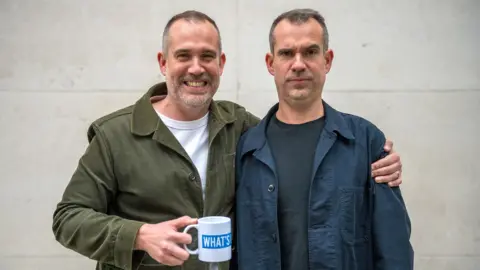
On the podcast, they often disagree with each other over competing claims about health and wellbeing, much like they do in real life.
Xand laughs after Chris says it's a hard job working "with a brother like Xand who is so intensely annoying".
But really the brothers love working together and Chris admits that they started the podcast "quite selfishly as we were just trying to answer our own questions".
"But it turns out our problems are similar to everyone else's."
They say the podcast has changed their lives for the better and share what they have changed about their behaviour over the course of more than 30 episodes.

 Getty Images
Getty ImagesLike most of us, the brothers assumed eight hours was the gold standard for sleep and anything less was a failure. Now, they're far less dogmatic.
The brothers say a healthy range of sleep can be anywhere between six and 10 hours.
"There's so much anxiety around getting eight hours but some of the most important things in my life, like raising kids, I've done sleep deprived," says Chris.
Realising that everything from winning wars to completing exams were often done with very little sleep, made them understand that sleep deprivation can sharpen your focus in the short term.
Xand says this helped him "shed all that anxiety" around optimal sleeping patterns and times.
"It no longer dominates my life and I think about it a lot less."
He also feels a lot more comfortable taking naps when needed and says he will sometimes "have a 20 minute sleep if I'm exhausted".

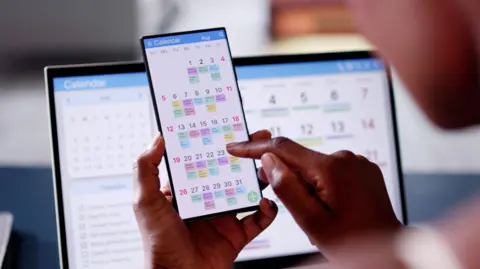 Getty Images
Getty ImagesThe pair both find saying "no" difficult and Xand says it can feel "almost physically painful."
They have now learnt the "power of the pause". If something does not require an immediate decision, they now ask for more time to think about it so they don't feel pressured into saying yes.
Chris says this has helped him have difficult conversations he may otherwise have put off. However, he admits he's still figuring out how to be more forceful.
"I know I should do, but somehow I'm not and I know I need to focus on that."
The podcast episode on this topic also taught them that they needed to work out what their values are and then weigh up whether requests fitted in with those. For Xand, his priority was spending more time with his wife and two sons.
He has since managed to say no to a number of things that he would have otherwise gone along with for an easy life.
"I recently said no to a very big and important work thing even though there was a lot of pressure on me to do it, but it didn't fit with my other commitments and what I wanted to do."
One of the most practical tips that has stuck with the brothers is how they brush their teeth.
The small act has become a mindful task and Xand explains he's totally changed the way he brushes.
"My wife, Dolly, hasn't complained about my bad breath since the episode.
"I use brushes for flossing, hold my toothbrush at a different angle and I don't look at my phone while brushing."
While Chris is shocked that his brother ever used his phone while brushing his teeth, he agrees with how powerful the changes have been.
"It's about the angle of the brush, being more gentle and having a better picture of what you're trying to achieve - you want to clean every surface of every tooth."

 Getty Images
Getty ImagesMany people believe that struggling with diet, exercise or breaking habits is down to personal weakness, and Xand shares those feelings.
"I feel lazy and inadequate most of the time.
"I go to Manchester every week and I usually arrive late after a long train journey and I order a takeaway and do no exercise then I beat myself up about it."
Their expert guest on this podcast episode, psychologist Kimberley Wilson, helped Xand understand that "there's no such thing as willpower".
Willpower is not this magic thing inside you, instead your ability to stick to something is "about the way you've arranged the world around you," he says.
For example, by planning ahead and thinking about what you'll have for dinner, you can more easily ditch the takeaway and eat something healthy.
Since the episode, Xand has managed to increase how much exercise he is doing, but still doesn't enjoy it.
"I just get on the exercise bike and have those negative thoughts while I do my workout," he says.
Another simple change he's made is taking a bag of apples with him on his regular commute between London and Manchester, rather than buying unhealthy snacks on the train.
Chris realised willpower wasn't about increasing your tolerance to distress and suffering, but simply being more organised.
"I've started batch-cooking which now releases time for me to do things like read with my daughter."

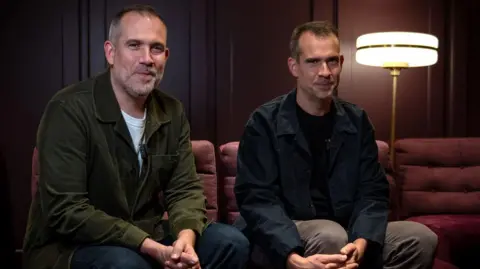
For all the changes they've embraced, the brothers are the first to admit they don't follow every bit of expert advice.
Take sunscreen, for example. "A dermatologist gave us really good advice," Dr Chris says, "but there's something about the sun that feels so powerful. Academically, we know sun exposure is bad and causes cancer but we still find ourselves drawn to it."
That tension - between what we know and what we do - is at the heart of their podcast.
If there's one thing the doctors hope listeners take away from the show, it's that struggling with health isn't a personal failure.
"So much of your health and well-being isn't your fault," says Dr Xand.
"There are loads of forces trying to take your money, attention and time away from the things that matter. What we're trying to do is sweep that out of the way, help you identify your values and align your life with them."



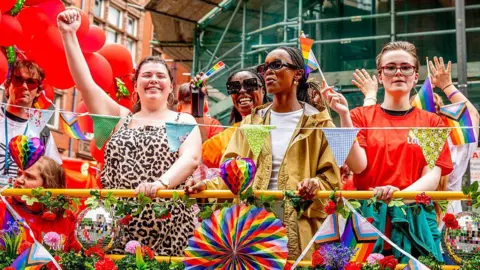 Getty Images
Getty ImagesWhen Saki Yew stepped off stage at this year's Manchester Pride, she felt "joyous".
The former Drag Race UK queen had spent weeks rehearsing and creating costumes for the performance at the city's Sackville Gardens in August.
It was effort she was happy to make for one of the UK's biggest LGBTQ+ events, and the reaction from the crowd made it worth it.
But when she asked Pride's organisers for her payment, she says there was silence.
The charity behind Manchester Pride went bust this week, leaving dozens of performers, vendors and backstage workers unpaid.
In a statement confirming it had gone into liquidation, bosses blamed a "combination of rising costs, declining ticket sales and an ambitious refresh of the format aimed to challenge these issues".
But some believe repeated warning signs about the sustainability of the event weren't heeded.
Manchester Pride started in 1985 as a two-week fundraising event.
Since then, it's grown in size and influence, becoming the first UK organisation to add black and brown stripes to the rainbow flag to represent LGBTQ+ people of colour.
By 2025 Manchester was one of the biggest Pride events in the UK, alongside London and Brighton's annual celebrations.
With its increasing size came bigger names, including Ariana Grande, Sophie Ellis-Bexter, Anastacia and Zara Larsson.
This year's star-studded line-up featured Nelly Furtado, Olly Alexander, and former Little Mix star Leigh-Anne.
But behind the scenes there were signs all was not well, according to people who worked on this year's event.

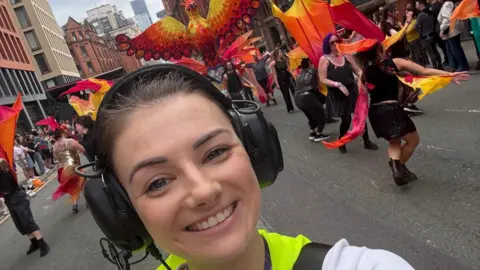 Abbie Ashall
Abbie AshallEvent manager Abbie Ashall had worked for Manchester Pride since 2023, and was a project manager for this year's parade.
She tells BBC Newsbeat many charities were hit hard by the Covid-19 pandemic, and there was evidence Manchester Pride had also been affected.
Abbie says she was given strict budgets to stick to, and noticed that former colleagues who left were not replaced.
Yet, at the same time, Abbie says, Pride's organisers launched Mardi Gras this year - a two-day, ticketed event at Manchester's high-capacity Mayfield Depot.
Attendees reported that crowds were small, and Abbie says the event was not considered successful.
Contractor Chris O'Connor worked at Manchester Pride for five years as a runner, a role he describes as a mixture of organisation and "troubleshooter-slash-firefighter".
He says working in the run-up to previous Pride weekends had been "a joy", but that 2025 had presented "red flags" and "major issues" for him to resolve from the start.
He believes Manchester Pride, which reported a loss of about £468,000 in 2023, should have had better control of the finances.
Both Chris and Abbie say they are still owed money for their work on 2025's event.
In Chris's case, he says not being paid prevented him visiting his son, who has just started university in Ireland.
Saki Yew tells Newsbeat she has "a life outside of drag" and "bills and groceries to pay for".
Like Chris, Saki believes Pride's organisers could have been more transparent about their financial troubles while people waited for payment.
"It's highly disrespectful," says Saki.
"You've kept us in the dark, you've just disrespected every single person on what they do and what they provide for you."

 Getty Images
Getty ImagesSome suspect the lack of communication from Manchester Pride's organisers over payment is linked to its failed bid to host 2028's Europride.
The international event usually attracts huge crowds, and Abbie believes Pride bosses were banking on "the funding that would have come with that from Manchester City Council and beyond".
When it was announced that Limerick and Clare, in Ireland, had won the bid earlier this month, hopes for potential Europride investment disappeared.
"I think they took a massive swing and it was a miss," says Abbie.
The exact details of the circumstances leading up to Manchester Pride going into liquidation aren't yet known.
However, the Charity Commission, which works to ensure organisations in England and Wales comply with the law, is "assessing concerns" after Pride's bosses submitted a "serious incident report relating to its finances".
There are also questions about future events in Manchester, and what shape they will take.

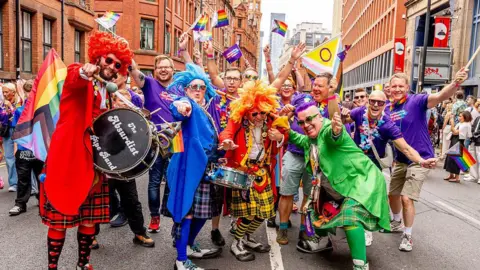 Getty Images
Getty ImagesOn the streets of the city, it's not hard to find people who attended this year's Pride and want to see the celebration return.
Kieran, 24, from Oldham, believes "it's something that everyone in Manchester looks forward to".
"It brings all types of culture and people together," he says.
Lexi agrees Pride is "a big part of not only the culture of this city, but so important for the community itself".
"If we don't have Pride, what else do we have?"
Lexi says attending Pride events after she'd just come out was "a really important time" and "it would be horrible for people to lose that opportunity".
Manchester City Council has said it will "support a new chapter for Manchester Pride weekend, which will take place next August".
Lexi is optimistic.
"I would be happy to put my money into something, especially if it's going to go back to the community," she says.
There had been complaints about staging events outside Manchester's gay village and focusing on spectacle over supporting LGBTQ+ causes.
"Maybe there's a way around it in creating a cheaper, more sustainable Pride," Lexi hopes.
But for the workers that may depend on, trust has been lost as well as money.
"This charity is there to platform and support queer artists and practitioners," says Abbie.
"For all of those people to be at a loose end when this is the charity that is meant to raise them up more than anybody - that's where it's deeply frustrating and really upsetting."
The BBC approached Manchester Pride for comment but it did not respond.
In a statement shared on social media, Manchester Pride's Board of Trustees expressed "regret" for delays in communication, but said it was "keen not to jeopardise financial opportunities while our discussions were ongoing".
It said it had hoped to find a way to continue to support those who had contributed, and was "sincerely sorry for those who will now lose out financially from the current situation".
"We have put our hearts and souls into the celebration and community activities over two decades," it added.
"We hope and believe that this leaves a positive and lasting legacy for the Pride movement in Greater Manchester."
Additional reporting by Georgia Levy-Collins.



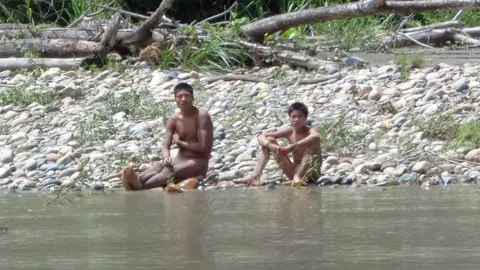 Fenamad
FenamadTomas Anez Dos Santos was working in a small clearing in the Peruvian Amazon, when he heard footsteps approaching in the forest.
He realised he was surrounded, and froze.
"One was standing, aiming with an arrow," he says. "And somehow he noticed I was here and I started to run."
He had come face to face with the Mashco Piro. For decades, Tomas - who lives in the small village of Nueva Oceania - had been practically a neighbour to these nomadic people, who shun contact with outsiders. However, until very recently, he had rarely seen them.
The Mashco Piro have chosen to be cut off from the world for more than a century. They hunt with long bows and arrows, relying on the Amazonian rainforest for everything they need.
"They started circling and whistling, imitating animals, many different types of birds," Tomas recalls.
"I kept saying: 'Nomole' (brother). Then they gathered, they felt closer, so we headed toward the river and ran."

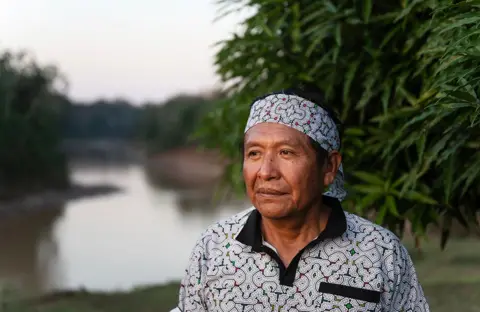
A new report by the human rights organisation, Survival International, says there are at least 196 of what it calls "uncontacted groups" left in the world. The Mashco Piro is believed to be the largest. The report says half of these groups could be wiped out in the next decade if governments don't do more to protect them.
It claims the biggest risks are from logging, mining or drilling for oil. Uncontacted groups are extremely vulnerable to basic disease - as such, the report says a threat is posed by contact with evangelical missionaries and social media influencers looking for clicks.
Recently, Mashco Piro people have been coming to Nueva Oceania more and more, according to locals.
The village is a fishing community of seven or eight families, sitting high on the banks of the Tauhamanu River in the heart of the Peruvian Amazon, 10 hours from the nearest settlement by boat.
The area is not recognised as a protected reserve for uncontacted groups, and logging companies operate here.
Tomas says that, at times, the noise of logging machinery can be heard day and night, and the Mashco Piro people are seeing their forest disturbed and destroyed.
In Nueva Oceania, people say they are conflicted. They fear the Mashco Piro's arrows but they also have deep respect for their "brothers" who live in the forest and want to protect them.
"Let them live as they live, we can't change their culture. That's why we keep our distance," says Tomas.

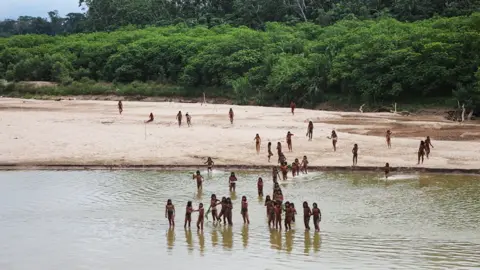 Fenamad
FenamadThe people in Nueva Oceania are worried about the damage to the Mascho Piro's livelihood, the threat of violence and the possibility that loggers might expose the Mashco Piro to diseases they have no immunity to.
While we were in the village, the Mashco Piro made their presence felt again. Letitia Rodriguez Lopez, a young mother with a two-year-old daughter, was in the forest picking fruit when she heard them.
"We heard shouting, cries from people, many of them. As if there were a whole group shouting," she told us.
It was the first time she had encountered the Mashco Piro and she ran. An hour later, her head was still pounding from fear.
"Because there are loggers and companies cutting down the forest they're running away, maybe out of fear and they end up near us," she said. "We don't know how they might react to us. That's what scares me."
In 2022, two loggers were attacked by the Mashco Piro while fishing. One was hit by an arrow to the gut. He survived, but the other man was found dead days later with nine arrow wounds in his body.

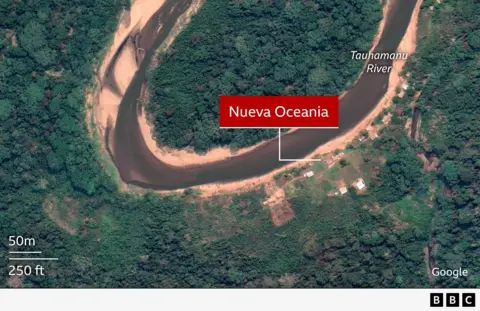 Google/BBC
Google/BBCThe Peruvian government has a policy of non-contact with isolated people, making it illegal to initiate interactions with them.
The policy originated in Brazil after decades of campaigning by indigenous rights groups, who saw that initial contact with isolated people lead to entire groups being wiped out by disease, poverty and malnutrition.
In the 1980s, when the Nahau people in Peru made initial contact with the world outside, 50% of their population died within a matter of years. In the 1990s, the Muruhanua people faced the same fate.
"Isolated indigenous peoples are very vulnerable - epidemiologically, any contact could transmit diseases, and even the simplest ones could wipe them out," says Issrail Aquisse from the Peruvian indigenous rights group, Femanad. "Culturally too, any contact or interference can be very harmful to their life and health as a society."
For the neighbours of uncontacted tribes, the reality of no-contact can be tricky.
As Tomas shows us around the forest clearing where he encountered the Mashco Piro, he stops, whistles through his hands and then waits in silence.
"If they answer, we turn back," he says. All we can hear is the chatter of insects and birds. "They're not here."
Tomas feels the government has left the residents of Nueva Oceania to handle a tense situation by themselves.
He plants food in his garden for the Mashco Piro to take. It is a safety measure he and other villagers have come up with to help their neighbours and protect themselves.
"I wish I knew the words to say, 'Here have these plantains, it's a gift,'" he adds. "'You can take them freely. Don't shoot me.'"


Almost 200km south-east on the other side of the dense forest, the situation is very different. There, by the Manu River, the Mashco Piro live in an area that is officially recognised as a forest reserve.
The Peruvian Ministry of Culture and Fenamad run the "Nomole" control post here, staffed by eight agents. It was set up in 2013 when conflict between Mashco Piro and local villages resulted in several killings.
As the head of the control post, Antonio Trigoso Ydalgo's job is to stop that from happening again.
The Mashco Piro appear regularly, sometimes several times a week. They are a different group of people from those near Nueva Oceania, and the agents don't believe they know each other.

 Fenamad
Fenamad"They always come out at the same place. That's where they shout from," Antonio says, pointing across the wide Manu River to a small shingly beach on the other side. They ask for plantain, yucca or sugar cane.
"If we don't answer, they sit there all day waiting," Antonio says. The agents try to avoid that, in case tourists or local boats pass by. So they usually comply. The control post has a small garden they grow food in. When it runs out, they ask a local village for supplies.
If these aren't available, the agents ask the Mashco Piro to come back in a few days' time. It has worked so far, and there has been little conflict recently.
There are about 40 people who Antonio sees regularly - men, women and children from several different families.
They name themselves after animals. The chief is called Kamotolo (Honey Bee). The agents say he is a stern man and never smiles.
Another leader, Tkotko (Vulture) is more of a joker, he laughs a lot and makes fun of the agents. There is a young woman called Yomako (Dragon) who the agents say has a good sense of humour too.
The Mashco Piro don't seem to have much interest in the outside world but are interested in the personal lives of the agents they meet. They ask about their families and where they live.

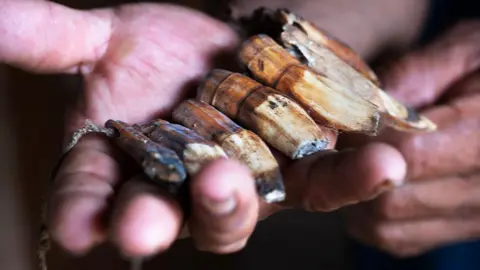
When one agent was pregnant and went on maternity leave, they brought a rattle made from the throat of a howler monkey for the baby to play with.
They are interested in the agents' clothes, especially sports clothes in red or green. "When we approach, we put on old, torn clothes with missing buttons - so they don't take them," Antonio says.
"Before, they wore their own traditional clothing - very beautiful skirts made with threads from insect fibres that they crafted themselves. But now some of them, when tourist boats pass, receive clothes or boots." says Eduardo Pancho Pisarlo, an agent at the control post.

 Fenamad
FenamadBut any time the team ask about life in the forest, the Mashco Piro shut the conversation down.
"Once, I asked how they light their fires," says Antonio. "They told me, 'You have wood, you know.' I insisted, and they said, 'You already have all these things - why do you want to know?'"
If someone doesn't appear for quite a while, the agents will ask where they are. If the Mashco Piro say, "Don't ask", they take it to mean that person has died.
After years of contact, the agents still know little about how the Mashco Piro live or why they remain in the forest.
It is believed they may be descended from indigenous people who fled into the deep jungle in the late 19th Century, escaping rampant exploitation and widespread massacres by so-called "rubber barons".
Experts think the Mashco Piro may be closely related to the Yine, an indigenous people from south-eastern Peru. They speak an antiquated dialect of the same language, which the agents, who are also Yine, have been able to learn.
But the Yine have long been river navigators, farmers and fishermen, while the Mashco Piro seem to have forgotten how to do these things. They may have become nomads and hunter-gatherers to stay safe.
"What I understand now is that they stay in one area for a while, set up a camp, and the whole family gather," says Antonio. "Once they've hunted everything around that place, they move to another site."

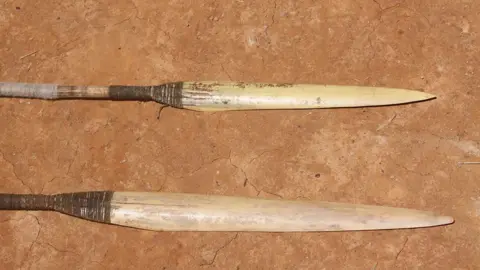 Fenamad
FenamadIssrail Aquisse from Fenamad says more than 100 people have come to the control post at various times.
"They ask for bananas and cassava to diversify their diet, but some families disappear for months or years after that," he says.
"They just say: 'I'm going away for a few moons, then I'll come back.' And they say goodbye."
The Mashco Piro in this area are well protected but the government is building a road which will connect it to an area where illegal mining is widespread.
But it is clear to the agents that the Mashco Piro do not want to join the outside world.
"From my experience here at the post, they don't want to become 'civilised'," Antonio says.

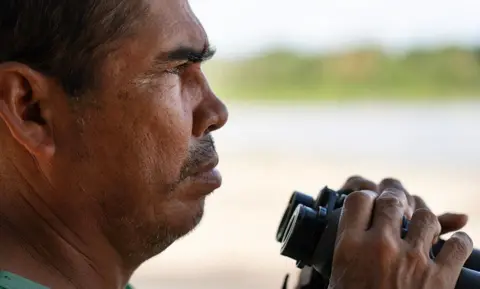
"Maybe the children do, as they grow up and see us wearing clothes, perhaps in 10 or 20 years. But the adults don't. They don't even want us here," he says.
In 2016, a government bill was passed to extend the Mashco Piro's reserve to an area that would include Nueva Oceania. However, this has never been signed into law.
"We need them to be free like us," says Tomas. "We know they lived very peacefully for years, and now their forests are being finished off - destroyed."

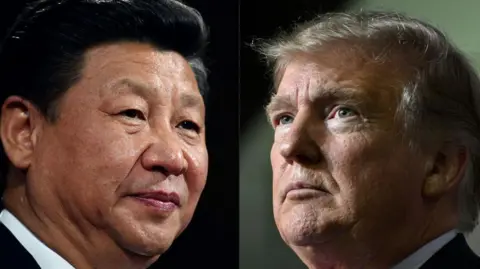 AFP via Getty Images
AFP via Getty ImagesUS President Donald Trump is arriving in Asia for a whirlwind week of diplomacy, which includes a much-anticipated meeting with his Chinese counterpart, Xi Jinping.
Top of the agenda between the two will be trade – an area where tensions between the world's two biggest economies have once again been ramping up.
Trump lands in the Malaysian capital, Kuala Lumpur, as a summit for the Association of Southeast Asian Nations, or Asean, begins on Sunday. He will then visit Japan and finally South Korea, where the White House says he will meet Xi.
So what are the wins Trump and other leaders are hoping for, and what are the pitfalls?
Our correspondents explain what you should know about the week ahead.
By Anthony Zurcher, North America correspondent
Inking new trade deals that provide opportunities to American businesses while keeping the tariff revenue flowing into the US Treasury is sure to be a central focus of Trump's Asia trip.
While there are multiple players in the global trade dance, the key to Trump's success or failure is China. And Trump's scheduled meeting with Chinese leader Xi Jinping on the sidelines of Apec – the first since 2019 – could set the course for US-China relations for the rest of Trump's second term in office.
As the US president has acknowledged, draconian tariffs on Chinese imports are unsustainable. And while he has not explicitly said so, an escalating economic war with America's largest trading partner would have devastating consequences – for the US, for China and for the rest of the world.
The steep tumbles in the major US stock indexes every time China and the US appear at an impasse underlines this reality.
When he heads back to America next week, Trump is sure to be pleased if he is able to finalise a deal with South Korea and secure new Japanese investment in US manufacturing.
But his top priority is sure to be convincing Xi to resume purchases of American agricultural exports, loosen recent restrictions on foreign access to Chinese rare earth materials, give US companies greater access to the Chinese market and avoid a full-blown trade war.
For Trump, as the saying goes, that's the whole ballgame.
By Laura Bicker, China correspondent
When Chinese leader Xi Jinping meets Trump on 30 October in South Korea, he wants to be the tougher negotiator.
That is why he has been leveraging China's stranglehold on rare earths, the minerals without which you cannot make semiconductors, weapons systems, cars or even smartphones. It's a US weakness, and China is exploiting it – just like it is hurting American farmers, and Trump's rural vote base, by not buying their soybeans.
Xi has also learned lessons from Trump 1.0 and this time, Beijing, it appears, is willing to embrace the pain of tariffs. For one, the US, which once took in a fifth of Chinese exports, is no longer such a crucial market.

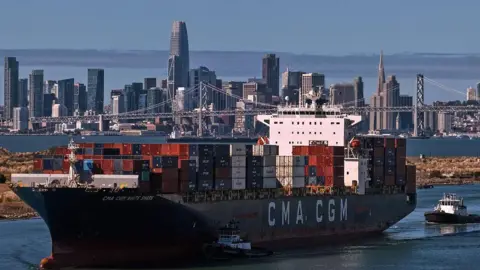 Getty Images
Getty ImagesStill Xi has a balance to strike, between an economic battle with the US, and his struggle with domestic challenges. And Washington knows about Xi's troubles: high youth unemployment, a real estate crisis, mounting local government debt and a population unwilling to spend.
Analysts believe China may offer to do a deal if Trump agrees to start exporting advanced AI chips or pull back on more military support for Taiwan.
But getting there won't be easy. One big difference is that it often seems like Trump is willing to roll a dice and gamble – but Xi is playing a much longer game.
So the question may be: can Trump wait it out?
By Jonathan Head, South East Asia correspondent
The US president appears interested in one thing only during his visit to Malaysia: playing the starring role in a ceremony arranged specially for him, at which Thailand and Cambodia will sign some kind of peace accord.
Differences between the two countries over their border remain unresolved, but, under pressure to come up with something, they have made progress in agreeing to demilitarise the border.
Neither can afford to disappoint President Trump. Back in July, when they were still bombing and shelling each other, his threat to end tariff talks forced them into an immediate ceasefire.
Other Asean member states will hope for Trump's mere presence, brief though it is, to normalise relations with the US.
They have had a tumultuous year in which their export-dependent economies were badly shaken by his tariff war. Exports from the region to the US have doubled since Trump's last visit to the Asean summit in 2017.
Once Trump leaves, the other leaders can settle down to normal business – the quiet, incremental diplomacy which advances the plodding progress of integration among them.
Also on the agenda is a conflict that doesn't have Trump's attention - the civil war in Myanmar, which has haunted every Asean gathering since it was triggered by a brutal coup in 2021.
By Suranjana Tewari, Asia business correspondent
Asia's manufacturing powerhouses, which make up much of the world's output, will be looking for respite from Trump's tariffs.
Some have agreed deals, while others are still stuck in talks – but none have signed an agreement.
So ink on paper, or at least promising talks, would be welcome.

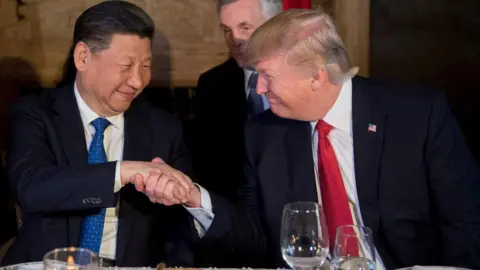 AFP via Getty Images
AFP via Getty ImagesTake China. The meeting between Trump and Xi signals progress, but the two leaders have a lot to unpick, from levies and export controls, to the source of it all: rivalry between the world's two biggest economies as they compete for an edge in AI and advanced tech.
Any ease in those tensions would bring relief to other countries in the region who have been caught in the middle. South East Asia may be the most trapped – it is deeply woven into US supply chains in electronics, for example, yet heavily reliant on Chinese demand.
Exports to the US have doubled over the past decade, but tariffs of 10% to 40% would pummel manufacturers in Vietnam, Indonesia, Singapore and Thailand.
It could also hurt US chipmakers like Micron Technology, which operates plants in Malaysia. The country exported around $10bn worth of semiconductors to the US last year, roughly a fifth of total US chip imports.
Wealthy economies like Japan and South Korea face a different dilemma.
Although close allies of the US, they are in for an unpredictable time – and will want to lock in tariff terms and investments. Automakers in both countries, which see the US as a key market, are already struggling to navigate the chaos.
By Shaimaa Khalil, Japan correspondent
Trump has described Japan's new prime minister, Sanae Takaichi, as a woman with great "strength and wisdom".
This week, her ability to forge a stable, working relationship with him will be an early test of her leadership - and of Japan's place in a shifting world order.
In her first speech in parliament, she pledged to raise Japan's defence budget, signalling her intent to shoulder more of the security burden with Washington.
Trump has spoken of this before and is expected to press Tokyo to contribute more to US troop deployments - Japan hosts the largest number of American forces abroad, about 53,000 personnel.

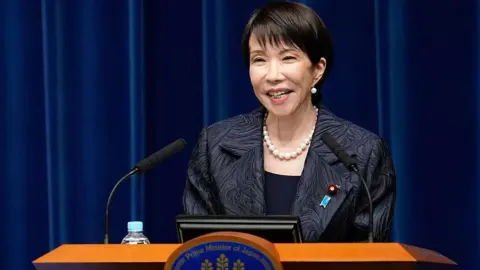 AFP via Getty Images
AFP via Getty ImagesBoth sides also want to finalise a tariff deal negotiated by her predecessor.
Particularly beneficial to Japan's auto giants - Toyota, Honda and Nissan - it cuts US import duties on Japanese cars from 27.5% to 15%, potentially making them more competitive against Chinese rivals.
By retaining Ryosei Akazawa as chief tariff negotiator, Takaichi is betting on continuity.
In return, Japan has pledged to invest $550bn in the US to strengthen supply chains in pharmaceuticals and semiconductors.
Trump has also said Japan will increase purchases of US farm products, including rice, a move welcomed in Washington but unsettling for Japanese farmers.
Takaichi's ties to the late former PM Shinzo Abe, who shared a close rapport with Trump, could also work in her favour.
Abe famously used rounds of golf at Mar-a-Lago to earn Trump's trust – it's the kind of personal diplomacy Takaichi may seek to emulate.
By Jake Kwon, Seoul correspondent
For South Korean President Lee Jae Myung, the pressing issue is Trump's tariffs.
But that thunder was briefly stolen by rampant speculation that Trump might visit the border to see North Korean leader Kim Jong Un.
Back in August, Lee dedicated most of his time in the Oval Office to flatter Trump as a "peacemaker". Trump responded with enthusiasm to the prospect of sitting down with Kim, who he hasn't seen since 2019. Kim said last month that he still remembers Trump "fondly".
Analysts believe Kim is hoping to legitimise his nuclear weapons programme with another summit with the US president. There is no indication that a meeting is in the works.
Either way, Lee has a trade deal to negotiate. Talks to lower US duties on South Korean exports from 25% to 15% have stalled, despite multiple trips by Seoul officials to Washington. The sticking point is Trump's insistence that Seoul invest $350bn upfront in the US – roughly a fifth of South Korea's economy, such a huge investment could create a financial crisis, Seoul fears.
But in recent days, Korean officials have voiced hope, speaking of tangible progress. And will be hoping for a signed deal by the end of the Wednesday's summit between Trump and Lee.

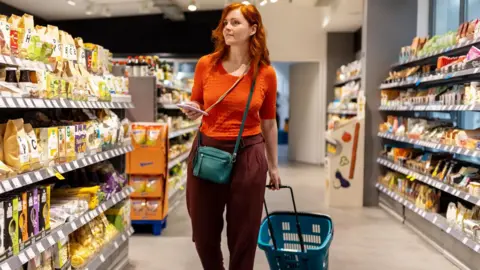 Getty Images
Getty ImagesThe bosses of Britain's biggest supermarkets have warned food prices could rise even further if higher taxes are imposed on the sector.
Grocers including Tesco, Asda, Sainsbury's and Morrisons signed a letter to Chancellor Rachel Reeves ahead of her Budget next month, along with Lidl, Aldi, Iceland, Waitrose and M&S.
They claimed households would "inevitably feel the impact" of any potential tax increases on the industry, such as higher business rates for supermarkets.
The Treasury said tackling food price inflation was a "priority" and said it was lowering business rates for "butchers, bakers and other shops".
In their letter to the Chancellor, supermarket bosses said if the industry was to face higher taxes, "our ability to deliver value for our customers will become even more challenging and it will be households who inevitably feel the impact".
"Given the costs currently falling on the industry, including from the last Budget, high food inflation is likely to persist into 2026," they warned.
"This is not something that we would want to see prolonged by any measure in the Budget."
Ahead of the chancellor's Autumn Budget next month, speculation is growing over her tax and spending policies.
She is widely expected to increase taxes following gloomy economic forecasts and a series of U-turns on cuts to welfare spending, which have made it more difficult for her to meet her self-imposed borrowing rules.
After announcing tax rises of £40bn in her previous Budget in November, which included a hike in the amount employers are required to pay in National Insurance Contributions, Reeves said she was "not coming back" for more tax rises.
But economists at the influential Institute for Fiscal Studies (IFS) have calculated a shortfall of £22bn in the public finances and suggested Reeves will "almost certainly" have to raise taxes.
The think tank cited rising borrowing costs for the government, weaker growth forecasts, and spending commitments made since the spring as reasons for the tight position.
Many industries in the run-up to the Budget often call on and lobby their views and position to the government, but rising food prices are once again putting pressure on people's finances.
The cost of many staples has spiked compared with butter prices up by 19% and milk over 12% along with chocolate and coffee rising 15%, according to the Office for National Statistics.
While higher taxes and minimum wage bills have hit supermarkets, food inflation has surged in part due to poor harvests globally, with disease and droughts affecting yields. Escalating trade tensions also have an impact.
Helen Dickinson, chief executive of the British Retail Consortium, which represents the UK's major supermarkets, said retailers were "doing everything possible to keep food prices affordable".
"But it's an uphill battle," she claimed, "with over £7bn in additional costs in 2025 alone," citing higher taxes.
The boss of Tesco, Ken Murphy, has previously said that "enough is enough" on business taxes.
The UK's largest supermarket said the higher National Insurance rate had cost it £235m this year, however, Tesco has upgraded its earnings outlook for the year, with expectations of full-year profits of between £2.9bn and £3.1bn.
Lidl revealed this week that its profits had surged threefold. Sales jumped by 7.9% as pre-tax profits hit £156.8m in the year to 28 February, up from £43.6m a year earlier.
The chancellor has previously said she is planning "targeted action to deal with cost of living challenges" in her budget, though on Friday she refused to rule out raising income tax, amid speculation she is considering breaking a key Labour election pledge.
Supermarket bosses highlighted that part of the government's business rates reforms posed a problem for the industry, in particular the so-called business rates surtax, which is being levied on all large commercial premises.
Business rates are a tax on non-domestic properties such as shops, pubs and offices.
In last year's Budget, the government announced its intention to introduce two lower figures used to calculate such rates for retail, hospitality and leisure properties with rateable values below £500,000.
Meanwhile, firms with properties with rateable values at and above £500,000 will pay a higher amount, which the government says will include the majority of large distribution warehouses, such as those used by online retail giants Amazon.
It is expected that the chancellor will confirm the rates businesses will have to pay at next month's Budget, along with further details, which will come into force in April 2026.
But the UK's supermarkets have argued large retail premises were a "tiny proportion of all stores, yet account for a third of retail's total business rates".
They urged the chancellor to "ensure that the proposed changes to business rates result in a significant reduction to the industry's rates burden".
"The chancellor has rightly made tackling inflation her top priority, and with food inflation stubbornly high, ensuring retail's rates burden doesn't rise further would be one of the simplest ways to help," said Ms Dickinson.
The Treasury said that business rates would be adjusted to reflect changes in the overall value of the tax base, "so that the system continues to raise the same amount of revenue in real terms".
"If the total value of rateable properties increases, the tax rate will generally fall," it added. "This means that even if a specific property's RV goes up, its bill could still decrease if the reduction in the tax rate is large enough to offset the increase in value.
"Ultimately, what businesses pay after a revaluation depends on both the new RVs and the adjusted tax rate."

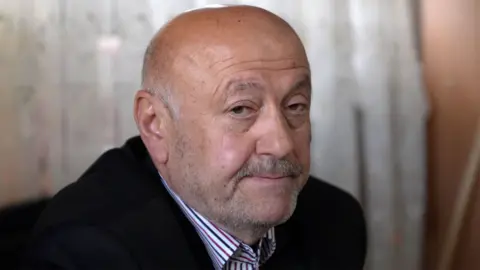 BBC
BBCA Turkish charity owner at the centre of sexual abuse allegations, brought to light by a BBC investigation, has been arrested.
BBC News Turkish revealed accusations that Sadettin Karagoz sexually exploited vulnerable women, promising them aid in return for sex. He denies all the allegations.
Mr Karagoz set up his charity in Turkey's capital, Ankara, in 2014. Syrian refugees desperate for help said at first he seemed like "an angel".
One of them, Madina, fled the Syrian civil war in 2016 and said that two years later, one of her children became critically ill and her husband abandoned her. Her name has been changed to protect her anonymity.
Left to care for three children alone, she went to Sadettin Karagoz's organisation, which translates as the Hope Charity Store. It gathers donations for refugees such as nappies, pasta, milk and clothes.

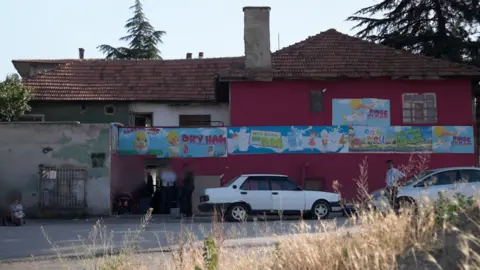
"He told me: 'When you have nowhere to go, come to me and I will look after you," she says.
But when she did, Madina says he changed. She describes how Mr Karagoz told her to go with him to an area in the office behind a curtain to get some supplies.
"He grabbed me," she says. "He started kissing me… I told him to get away from me. If I hadn't yelled, he would have tried to rape me."
Madina describes how she escaped from the building but Mr Karagoz later went to her home.
"I didn't open the door because I was terrified," she says, explaining that he threatened to have her sent back to Syria.
Scared of repercussions, Madina says she never went to the police and did not tell anyone else what had happened.

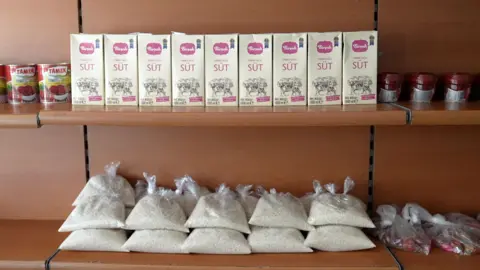
Mr Karagoz, a retired bank worker, denies the allegations and has told the BBC that his organisation has helped more than 37,000 people.
He says that the aid distribution area in the charity is small, crowded and monitored by CCTV so he could not have been alone with any woman.
Over the years, his charity has gained widespread recognition and won a local newspaper award in 2020. It has been featured on national TV, and he says it has attracted support from national and international organisations. In March this year he changed its Turkish name to My Home-meal Association.
In all, three women, including Madina, told the BBC that Mr Karagoz had sexually assaulted and harassed them.
Seven other people, including two former employees of his charity, say they either witnessed or heard first-hand testimony of him committing acts of sexual abuse between 2016 and 2024.

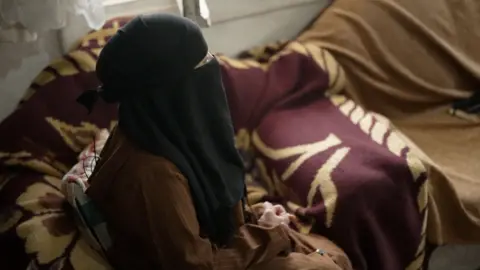
According to 27-year-old Syrian refugee Nada, he said he would only give her aid if she went to an empty flat with him. "If you don't, I won't give you anything," she says Mr Karagoz told her. Again, her name has been changed to protect her anonymity.
She was with her sister-in-law and says they stormed out. But desperate to provide for her family, she explains she didn't know where else to turn, so went back.
On one occasion, Nada says Mr Karagoz took her behind a curtain to get nappies for her son where "he tried to touch my breasts".
Another time, she says that "he came from behind and grabbed my hand… he forced me to touch his genitals".
Afraid of the stigma attached to sexual abuse and scared she would be blamed, Nada says she didn't feel she could tell anyone, even her husband.

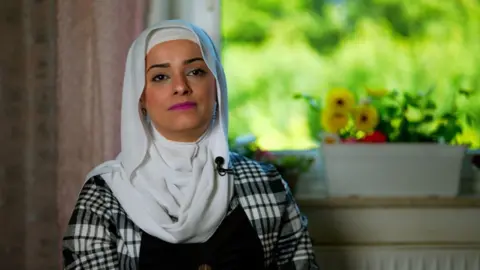
The third woman who told the BBC that Mr Karagoz had assaulted her is Batoul, who has since moved to Germany.
A single mother, she too says she went to him for help. "When I turned away to pick up the aid, he put his hands on my backside," she explains. "I left the aid and walked out of the shop."
These testimonies were not the first to surface against Mr Karagoz.
In 2019 and 2025 he was accused of sexual harassment and assault, but on both occasions prosecutors decided there was insufficient evidence to prosecute him. Police said neither victims nor witnesses were willing to come forward to make formal complaints.
Some women told us they were afraid testifying could lead to them being harassed or deported.
But after the BBC investigation, it is understood two other women came forward to report Mr Karagoz, and their testimony resulted in him being charged with sexual abuse. He is now in jail awaiting trial.
Batoul says she is "truly happy" he has been arrested, "for myself and for all the women who have suffered in silence and couldn't speak out because of fear".
She adds that she hopes it "gives courage and strength to all women who are being exploited in any way".

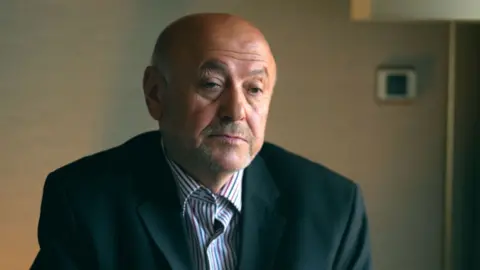
Before he was arrested, we put the allegations made by Madina, Nada, Batoul and charity workers to Mr Karagoz.
He denied all the accusations and claimed if they were true, more women would have come forward.
"Three people, five people, 10 people [could complain]. Such things occur," he said. "If you said 100, 200 [had accused me], then fine, then you could believe I actually did those things."
He also said he had diabetes and high blood pressure and showed us a medical report with details of an operation in 2016 to remove his left testicle. This meant he was not able to perform any sexual activity, he said.
However a professor of urology and specialist in men's sexual health, Ates Kadioglu, told the BBC that having one testicle removed "doesn't affect someone's sex life".
We put this to Mr Karagoz who insisted that sexual activity was "not possible for me".
We also put it to him that sexual assault may be motivated by a desire for power and control. He responded by saying: "I personally don't have such an urge."
"All we did was good deeds and this is what we get in return."
Sadettin Karagoz said women who accused him of assault in the past did so because he had reported them to the police for being involved in illegal activities.
All the women we spoke to denied they or their relatives were involved with crime and the BBC has seen no evidence to suggest that they were.

 Emergency Services of Ukraine
Emergency Services of UkraineAlthough moving forward, Oleksandr Volobuev's body is angled slightly away from the camera, as if bracing against the deadly air still swirling with falling debris and smoke.
His face in careful concentration, the Major-General from Ukraine's Civil Protection Service clings tightly to a precious bundle, wrapped for protection in his coat - and out of which two small pink shoes protrude.
It is a striking image of a dramatic rescue from a nursery school in the eastern city of Kharkiv, following a devastating, direct hit by a Russian drone.
Unsurprisingly it has gone viral, capturing both the Ukrainian and the wider global public's imagination.
With 48 children trapped in a shelter in the burning building, it was not the only act of bravery that day, not by a long way.
But few photographs better sum up the growing impact of Russia's full-scale invasion on everyday life, with Ukraine's most vulnerable now bearing the brunt, including children.
"We got the call that there had been an attack on the kindergarten," Oleksandr Volobuev told me. "And, of course, knowing there would be children there, we set off in a state of some anxiety."
Little did he expect that by the end of that day, as a result of carrying that little girl to safety, he would find himself being hailed as a national hero.
In a split-second moment caught on camera, the Ukrainian people saw not only the reality of Russia's new strategy - its increasing attacks on civilian infrastructure - but also a stark depiction of their own resilience and defiance.
It's impossible to know why the Honey Academy, based in a sturdy, two-storey brick building in Kharkiv's Kholodnohirsky district, was hit by a Shahed drone.
The low, menacing hum of those Iranian-designed weapons, which carry a lethal 50kg payload, is now all too familiar, not only to soldiers on the front line, but to Ukrainians everywhere.
While they can be devastatingly accurate, the large volume being fired by Russia - with multiple waves of drones in each attack on cities across the country - means some inevitably malfunction.
Russia has regularly denied targeting residential areas, but maps of the city show no obvious military targets in the immediate vicinity of the kindergarten, and the Ukrainian government certainly spoke of it as deliberate.
"There is no justification for an attack on a kindergarten, nor can there ever be," President Volodymyr Zelensky said shortly after the strike. "Clearly, Russia is growing more brazen."

 Reuters
ReutersFedir Uhnenko was also with one of the emergency teams rushing to respond to the strike.
Normally, as a press officer with the Civil Defence Service, he is not so closely involved in frontline work.
But this time, seeing the disaster unfolding in front of him, he knew he had to act.
"There'd been a huge explosion and there was horror in their eyes," he told me, on finding the children huddled in the building's basement.
Luckily, following the air raid warning that had sounded before the attack, the children had taken cover in the school's shelter there.
But with the fire still burning, the roof destroyed and the building filling with smoke and dust, they were still in danger.
His colleagues, as well as members of the public who had come to help, stepped forward one by one to scoop up a child.

 Emergency Services of Ukraine
Emergency Services of UkraineLike Oleksandr, his more senior commander, Fedir was pictured carrying a child to safety. In his case it was a young boy, through the rubble and smoke.
"I was reassuring him all the way that everything was fine, there was nothing to worry about," he explained.
"When we came out of the building, there was a car on fire. Our boys were putting it out. And, you know, I was surprised the kid didn't cry. There was certainly fear in his eyes."
"I said to him, go ahead and hold me as tight as you like. I'm quite big myself and, as you can see in the photo, he grabbed me so tightly."
In the end, he had fulfilled two roles: the rescue work and his day job too. His press officer's helmet-camera rolled throughout, capturing many of the up-close photographs and videos that have since been beamed around the world.
The children were carried to an emergency reception point in a safe zone, a few hundred metres from the nursery school.
All were unharmed, but there can be little doubt about the danger they faced.

 EPA/Shutterstock
EPA/ShutterstockOne adult working nearby was killed in the strike and nine others were wounded, one with serious burns and another a traumatic amputation of her leg.
For all the rescuers, Fedir told me, there was the constant awareness not only of the risks of fire, falling masonry and smoke, but of the possibility of another strike.
Russia has been known to hit the same target twice, which Ukrainians see as a deliberate strategy to kill emergency workers.
The day after the nursery school attack, one of these so called "double taps" killed a firefighter and wounded five of his colleagues in a village a short distance from Kharkiv.

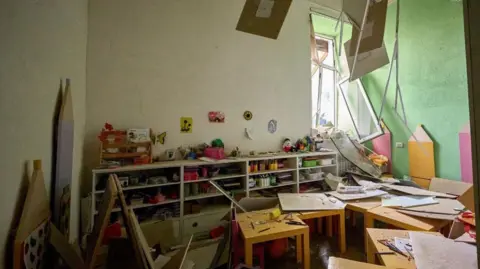 EPA
EPAUkraine believes Russia has turned to civilian targets in desperation over its inability to make significant gains on the battlefield.
Both Oleksandr and Fedir say what they saw at the kindergarten has done little to change their view of the enemy.
"From the beginning I have only one feeling that we must go through all this and win," Oleksandr told me.
I ask him what kind of future he envisages for the 48 young lives he helped save.
"Of course, only good, happy lives," he replied. "But not only our children. I would like all children to live in peace."

 Abbi Lily
Abbi LilyThere are few things British people love more than talking about the weather, and as winter approaches, this can often take the form of: "Have you turned the heating on yet?"
You may get different answers depending on where in the country you are - the northern and western parts of the UK are generally colder and wetter than the east and south.
But temperatures across the country are due to drop this weekend. And on Sunday the clocks go back, marking an official end to British Summer Time - and the return to darker evenings as winter draws in.
So will you wait until a particular date to reach for the thermostat? Or until the temperature drops below a certain point?
Abbi Lily, who makes personal finance content under the moniker abbitalksmoney, says she and her partner try to "wait until the absolute last minute" before turning the heating on, in order to save money.
They're currently using blankets and jumpers to stay warm "so we can hold off as long as possible", but they don't have a hard and fast rule about when the heating goes on.
When she spoke to the BBC earlier this week, Abbi said it was still quite mild where she lives near Bournemouth.
"I'm wearing shorts today!" she said.
The Energy Saving Trust recommends setting the thermostat to anywhere between 18C and 21C for most people.
The World Health Organisation (WHO) also recommends 18C for "healthy and well-dressed people". For older people, children and people with illnesses or disabilities, the WHO recommends 20C.
Some people might keep a closer eye on the outside temperature, instead of their thermostat. Simon King, the BBC's lead weather presenter, says 15C tends to be the magic number. "If the temperature is regularly below this for a few days or more, that is when people tend to switch their heating on."
Temperatures across the UK are expected to fall this weekend as colder air from the Arctic spreads in, he adds.

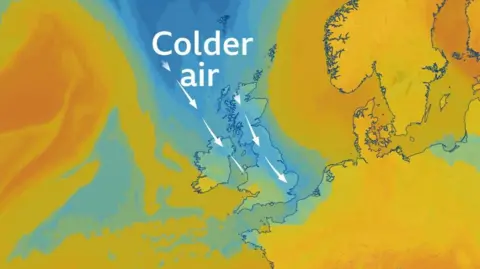
Rather than monitoring the temperature too closely, Gemma Bird from Essex waits until a certain date to turn the heating on.
"Growing up, my mum would only let us turn on the heating on 1 November," says Gemma, who shares money-saving household tips on Instagram.
"I remember thinking I'd never be like that, but obviously with the cost of everything now, I say: 'Is it 1 November? No? Put an extra blanket on.'"
Indeed, for many households, the question of when the heating goes on is about money, not health or comfort.
Aimee Blakey lives with her husband Sean and their son in a detached 1980s house in Wiltshire. The couple both come from farming backgrounds, she says, where they were taught: "If you're cold, you put a jumper on. If you're really cold, put a dressing gown on."
Aimee had always wanted an Aga, but buying a new one was too expensive when they started renovating two years ago. They were able to get a second-hand one, which they're now "obsessed with".

 Aimee Blakey
Aimee BlakeyAn Aga is an iron cooking range which absorbs heat and then releases it slowly, so the cooker stays warm even when it's not in use.
Agas originally ran on slow-burning coal, but today's models are powered by gas, electricity or biofuel. They can be expensive to run but, for Aimee and Sean, it saves them money on heating costs.
"It's like having a fire permanently in the house," she says. They first used the Aga on 1 October, but haven't switched their oil boiler on yet.
Aimee says she was worried about the cost of running the Aga when it was installed a year ago, but it's currently costing them less than the £100 a month they had budgeted for oil.
"Because it's oil we can fill it up at any time. We filled it up during the summer when it was cheaper."
American-born Olivia Carney lives in Greater Manchester with her British husband. She says she's amused by the "unspoken competition of who can turn it on the latest".
"In the US we kind of just turned it on whenever it was cold," Olivia, 33, says. But in the UK, "it's a hot topic in the office".
"There seems to be a clear divide of people waiting until the absolute last minute or people who are just like, 'Yeah, no, I'm not gonna be cold in my own house.'"
Olivia first turned the heating on in mid-October, with the thermostat set to 18C "so when it warms up to that it turns off".

 Olivia Carney
Olivia CarneyCaitlin Robinson, who studies energy and infrastructure-based inequality at the University of Bristol, says bills are still much higher than they were before Russia invaded Ukraine in 2022, leading to a spike in the cost of gas and electricity.
Dr Robinson says it can be "tricky to give advice" on lowering energy bills because most people are "sensible" and "savvy" anyway, especially if they're on a low income.
Her research indicates that it's not just low-income households that are making considerable cutbacks on their heating, as evidenced through the "record levels of energy debt" in Britain.
People struggling to pay their bills can experience heavy stress, Dr Robinson says.
Mental health can also suffer if people aren't having people around to the house because they can't heat it, leading them to become socially isolated.
Privacy, too, can be in short supply if families are only heating one or two rooms in a house and people have little space to themselves.
Gemma, who works from home, wears tights under her clothes and swears by her electric blanket.
"I can turn [the heating] on if I have to, but obviously there are loads of people who can't, which is awful."
A giant mug of instant black coffee and no food is not what you'd expect the host of a wellness podcast to have for breakfast.
Yet it's what Dr Chris van Tulleken, who hosts the BBC's What's Up Docs alongside identical twin brother Dr Xand confesses to having.
"I'm approaching middle age so don't want to eat all day. My way of not eating all day is not eating breakfast," he says.
It's this kind of honesty about not leading the perfect life and struggling with the stuff they know they should do but still don't, that makes them so relatable.
The brothers are both medical doctors who've become household names through their TV and radio work - they present children's series Operation Ouch! and Dr Xand is one of BBC's Morning Live resident experts while Dr Chris is well known for his bestselling book Ultra-Processed People.


On the podcast, they often disagree with each other over competing claims about health and wellbeing, much like they do in real life.
Xand laughs after Chris says it's a hard job working "with a brother like Xand who is so intensely annoying".
But really the brothers love working together and Chris admits that they started the podcast "quite selfishly as we were just trying to answer our own questions".
"But it turns out our problems are similar to everyone else's."
They say the podcast has changed their lives for the better and share what they have changed about their behaviour over the course of more than 30 episodes.

 Getty Images
Getty ImagesLike most of us, the brothers assumed eight hours was the gold standard for sleep and anything less was a failure. Now, they're far less dogmatic.
The brothers say a healthy range of sleep can be anywhere between six and 10 hours.
"There's so much anxiety around getting eight hours but some of the most important things in my life, like raising kids, I've done sleep deprived," says Chris.
Realising that everything from winning wars to completing exams were often done with very little sleep, made them understand that sleep deprivation can sharpen your focus in the short term.
Xand says this helped him "shed all that anxiety" around optimal sleeping patterns and times.
"It no longer dominates my life and I think about it a lot less."
He also feels a lot more comfortable taking naps when needed and says he will sometimes "have a 20 minute sleep if I'm exhausted".

 Getty Images
Getty ImagesThe pair both find saying "no" difficult and Xand says it can feel "almost physically painful."
They have now learnt the "power of the pause". If something does not require an immediate decision, they now ask for more time to think about it so they don't feel pressured into saying yes.
Chris says this has helped him have difficult conversations he may otherwise have put off. However, he admits he's still figuring out how to be more forceful.
"I know I should do, but somehow I'm not and I know I need to focus on that."
The podcast episode on this topic also taught them that they needed to work out what their values are and then weigh up whether requests fitted in with those. For Xand, his priority was spending more time with his wife and two sons.
He has since managed to say no to a number of things that he would have otherwise gone along with for an easy life.
"I recently said no to a very big and important work thing even though there was a lot of pressure on me to do it, but it didn't fit with my other commitments and what I wanted to do."
One of the most practical tips that has stuck with the brothers is how they brush their teeth.
The small act has become a mindful task and Xand explains he's totally changed the way he brushes.
"My wife, Dolly, hasn't complained about my bad breath since the episode.
"I use brushes for flossing, hold my toothbrush at a different angle and I don't look at my phone while brushing."
While Chris is shocked that his brother ever used his phone while brushing his teeth, he agrees with how powerful the changes have been.
"It's about the angle of the brush, being more gentle and having a better picture of what you're trying to achieve - you want to clean every surface of every tooth."

 Getty Images
Getty ImagesMany people believe that struggling with diet, exercise or breaking habits is down to personal weakness, and Xand shares those feelings.
"I feel lazy and inadequate most of the time.
"I go to Manchester every week and I usually arrive late after a long train journey and I order a takeaway and do no exercise then I beat myself up about it."
Their expert guest on this podcast episode, psychologist Kimberley Wilson, helped Xand understand that "there's no such thing as willpower".
Willpower is not this magic thing inside you, instead your ability to stick to something is "about the way you've arranged the world around you," he says.
For example, by planning ahead and thinking about what you'll have for dinner, you can more easily ditch the takeaway and eat something healthy.
Since the episode, Xand has managed to increase how much exercise he is doing, but still doesn't enjoy it.
"I just get on the exercise bike and have those negative thoughts while I do my workout," he says.
Another simple change he's made is taking a bag of apples with him on his regular commute between London and Manchester, rather than buying unhealthy snacks on the train.
Chris realised willpower wasn't about increasing your tolerance to distress and suffering, but simply being more organised.
"I've started batch-cooking which now releases time for me to do things like read with my daughter."


For all the changes they've embraced, the brothers are the first to admit they don't follow every bit of expert advice.
Take sunscreen, for example. "A dermatologist gave us really good advice," Dr Chris says, "but there's something about the sun that feels so powerful. Academically, we know sun exposure is bad and causes cancer but we still find ourselves drawn to it."
That tension - between what we know and what we do - is at the heart of their podcast.
If there's one thing the doctors hope listeners take away from the show, it's that struggling with health isn't a personal failure.
"So much of your health and well-being isn't your fault," says Dr Xand.
"There are loads of forces trying to take your money, attention and time away from the things that matter. What we're trying to do is sweep that out of the way, help you identify your values and align your life with them."



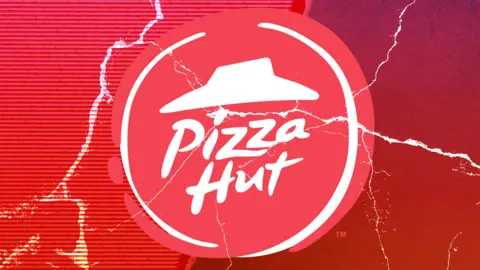 BBC
BBCPizza Hut was once a go-to for families and friends to tuck into its all-you-can eat buffet, unlimited salad bar, and self-serve ice-cream with all the toppings.
But fewer diners are "hitting the Hut" these days and it is closing half its UK restaurants after being bought out of administration for the second time this year.
"We used to go to Pizza Hut when I was a child," says Prudence, when the BBC asked shoppers in London why they thought the chain was struggling. "It was like a family thing, you'd go on a Sunday - make a day of it." But now aged 24 she says "it's not a thing anymore".
For 23-year-old Martina Debnatch it is some of the very things Pizza Hut has been known and loved for since it opened in the UK in the 1970s that are now not-so-hot.
"The way they do their buffet and their salad bar, it feels like they are cheapening on their quality and have lower standards...They're giving away so much food and you're like 'How?'"

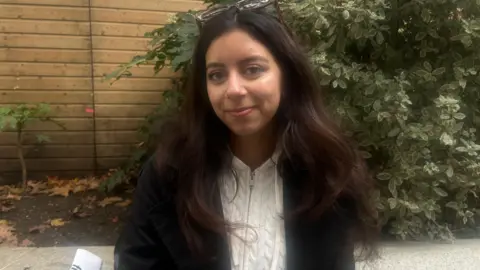
As food prices have soared, Pizza Hut's all-you-can-eat model has become very expensive to run. As have its 132 restaurants which are being sliced to 64.
The business, like many others, has also seen its costs increase. In April this year, staffing costs jumped due to rises in minimum wages (which went up nearly 7% this year, to £12.21 for employees aged 21 and over) as well as an increase in employer national insurance contributions.
Chris, 36, and Joanne, 29 say they used to go to Pizza Hut for a date "every now and then", but now they order in a Domino's and think Pizza Hut is "very overpriced".


Depending on your order, Pizza Hut and Domino's prices are similar, says Giulia Crouch, food expert and author of The Happiest Diet in the World.
While Pizza Hut does offer takeaway and deliveries through Ubers Eats, Deliveroo and Just Eat, it is losing out to big rivals which solely cater to this market.
"Domino's has managed to dominate the takeaway pizza sector thanks to aggressive marketing and constantly running deals that make consumers feel like they're getting a bargain, when in reality the original prices are quite high," says Ms Crouch.
But for Chris and Joanne it is worth it to get their date night delivered to their door.
"We definitely eat at home now more than we eat out," says Joanne, echoing recent statistics that show a drop in people going to casual and fast-food restaurants.

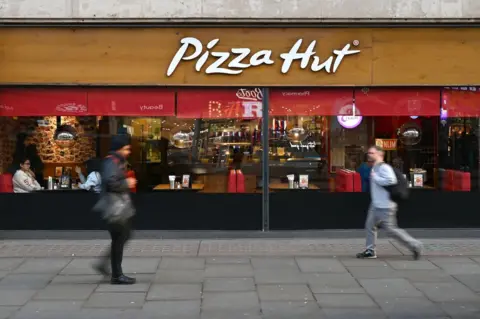 John Keeble/Getty Images
John Keeble/Getty ImagesOver the summer, casual and fast-food restaurants saw a 6% drop in customers compared to last summer.
There is also another rival to restaurant and takeaway pizzas: the cook-at-home oven pizza.
Will Hawkley, head of leisure and hospitality at KPMG, points out that not only have supermarkets been offering high-quality oven-ready pizzas for years - some are even selling home-pizza ovens.
"Lifestyle changes are also playing a factor in the success of fast-food chains," says Mr Hawkley.
The rising popularity of high protein diets has boosted sales at chicken shops, while hitting sales of carb-heavy pizza, he adds.
As people go out to eat less frequently they may look for a more a premium experience and Pizza Hut's American-diner style with booth seating and red and white checked plastic table cloths can feel more retro than upmarket.
The "explosion of high-quality pizzerias" over the last 10 to 15 years, such as Franco Manca, has "fundamentally changed the public's perception of what good pizza is," says Ms Crouch.
"A light, fresh, easy-to-digest product with a few choice toppings, not the massively greasy, heavy and overloaded pizzas of the past. That, I think, is what's caused Pizza Hut's downfall," she says.
"Why would anyone spend £17.99 on a small, substandard, disappointing pizza from a chain when you can get a beautiful, masterfully-made Margherita for under a tenner at one of the many authentic Italian pizzerias around the country?
"It's a no-brainer."

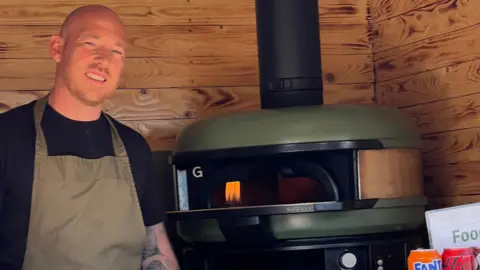 Dan Puddle
Dan PuddleDan Puddle, who owns Smokey Deez, a small mobile pizza van based in Suffolk says: "It's not that people have fallen out of love with pizza - they just want better pizza for their money."
Dan says his flexible operation can offer premium pizza at accessible prices, and that Pizza Hut struggled because it could not keep up with new customer habits.
At Pizzarova, a small independent chain based in Bristol, owner Jack Lander says the pizza market is broadening but Pizza Hut has failed to offer anything new.
"You now have slice concepts, London pizza, new haven, sourdough, Neapolitan, Detroit - it's a heavenly minefield for a pizza-loving consumer to explore."
Jack says Pizza Hut "needs to reinvent itself" as younger people don't have any sense of nostalgia or loyalty to the brand.

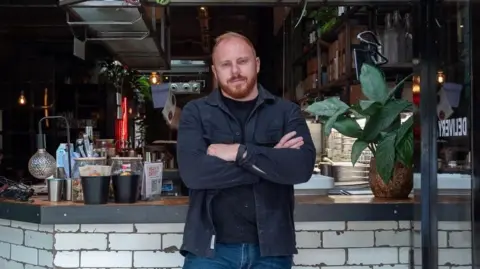 Jack Lander
Jack LanderOver time, Pizza Hut's market has been sliced up and distributed to its trendier, more nimble rivals. To maintain its expensive staffing and restaurants, it would have to increase costs - which KPMG's Mr Hawkley says is difficult at a time when household budgets are shrinking.
Nicolas Burquier, Pizza Hut's managing director of international markets, said the buyout aimed "to safeguard our guest experience and protect jobs where possible".
He said its immediate priority was to continue operating at the remaining 64 restaurants and 343 delivery sites and to support colleagues through the transition.
But with so much money going in to running its restaurants, it likely can't afford to invest too much in its delivery service because the sector is "complex and partnering with existing delivery apps comes at a cost", Mr Hawkley says .
But, he adds, cutting its costs by leaving oversaturated towns and city centres could be a good way to adapt.

 Stephen Buffardi
Stephen BuffardiAs Stephen Buffardi was transferring photos to his new phone, the progress bar reached halfway - then it crashed.
Thousands of pictures with friends and family, including early dates with his now wife, were lost forever.
"It was annoying," says the 36-year-old, who lives in Massachusetts. He and his wife Weena, 32, now have a six-year-old daughter, Sophia.
"When you have a kid you're like, it would have been nice to have those photos now - to save them for her."
Sophia will never be able to see the pictures of her parents when they first met.
For Stephen, this was a moment of realisation that digital photos don't always stand the test of time. So he decided to start making physical albums for her.

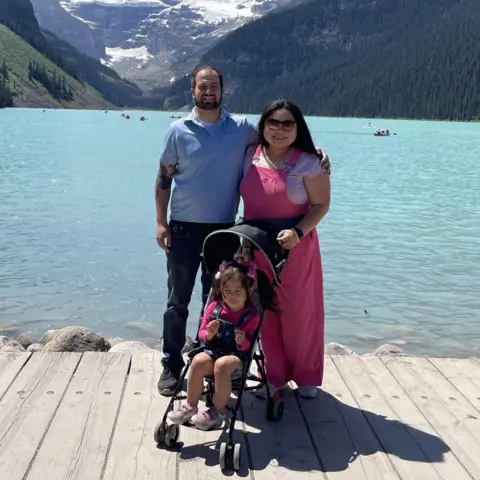 Stephen Buffardi
Stephen BuffardiHe's documented her life as a newborn - featuring her hospital tag and ink prints of her tiny feet - as well as one for each year of her childhood so far.
And he's currently putting together an album which will show her life as a five-year-old. Earlier this week he ordered 300 photographs to be printed.
This is nothing new - people have been compiling photo albums and scrapbooks for more than 100 years. It took off after World War Two when film photography became much more affordable.
But what should you think about if you want to keep your photos safe?
Experts broadly agree you should keep three versions of your most treasured pictures: the original on your phone, one copy online and one on a hard drive.
Some suggest going one step further - printing them out.

 Stephen Buffardi
Stephen BuffardiIn a digital world, preserving information is everyone's problem.
Last week the UK government told businesses they should have contingency plans on paper in case of cyber-attacks. And just days ago, a problem with Amazon Web Services disrupted more than 1,000 businesses globally.
Christopher Barnatt, a former computing and future studies lecturer and YouTuber, says this is why we should think about making physical copies of all important documents - for example birth certificates, insurance papers and passports.
Photos are arguably no different. And there are plenty of tools we can use to protect them.
One obvious step is to back them up onto an online cloud service like Apple's iCloud or Google Photos. Smartphones often do this automatically.
But there are issues like space and cost.
iCloud has a limit of 5GB - which covers photos as well as iPhone backups and other app data. After that, it charges UK users £0.99 per month for up to 50GB of space. Google Photos offers 15GB - shared with the user's Gmail and Google Drive content - before charging.
While these services are very stable, they are not totally risk-free.
Earlier this year, a woman in North Carolina told the WBTV news outlet that her iCloud account was hacked and her password was changed. She lost access to her photos and videos and said Apple told her there was nothing they could do about it.
You don't have to be hacked though. If you're really unlucky you might forget your password and be unable to restore it - meaning you can't log back into your cloud service.
It's probably safer to keep your photos on a cloud service than on social media.
"A lot of people use social media almost like a diary. Social media platforms are set up to sort of serialise people's lives and [create] narratives," says Dr Esperanza Miyake of the University of Strathclyde, who researches how social media companies treat people's data.
In 2019, a server migration by MySpace - which was once the most popular social media platform in the world - resulted in the loss of 12 years' worth of music uploads.
They were "all gone", says Dr Miyake.
Some were songs people had written and recorded at home so their friends could listen to them. The company apologised for the data loss.
There can be a cost issue, too. Earlier this month Snapchat announced it would start charging people for storing photos and videos on their messaging app, much to the annoyance of some users.
It said 5GB of storage would remain free but after that users would be charged $1.99 (£1.48) per month for up to 100GB of space.
Prof Winters suggests there will always be a problem with treating commercial platforms as archives. "They don't have an archival function. They're commercial entities.
"The assumption that we will always be able to keep uploading every single photo we take and have it preserved in perpetuity by a commercial entity is one that's going to be tested at various points."
This is why downloading your photos and keeping them on an external device like a hard drive or memory card is a good idea.
You shouldn't have to worry about images becoming unreadable for a very long time - thanks to "robust" image file formats like jpeg, according to Prof Winters.
Many hard drives work for up to 10 years - with some lasting for 20 - so it's important to move your pictures to new hard drives as the decades pass.

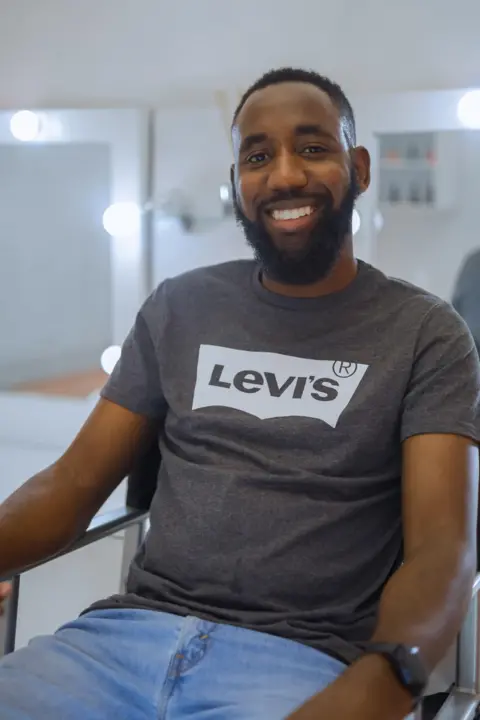 Thendo Muloiwa
Thendo MuloiwaIf you've got your three copies of your photos, you're in a good place. But what about printing them out?
Despite the risks of fire, water damage, or simply being misplaced, it's still a genuinely durable way of passing down memories through the generations.
Dr Barnatt and Dr Miyake say people who grew up with social media and mobile phones should keep offline copies of their most beloved items.
"It's about valuing what's important to you before it's too late," says Prof Winters.
If you start thinking about printing out your digital archive too late in life, "you may have lost the things you value already".
South African Thendo Muloiwa has decided to do just that, at the age of 28.
He loves the photo albums his parents made for him when he was a young child and wants to do the same with the digital pictures he has snapped using his phone. They show the places he has been and the friends he has made during his 20s.

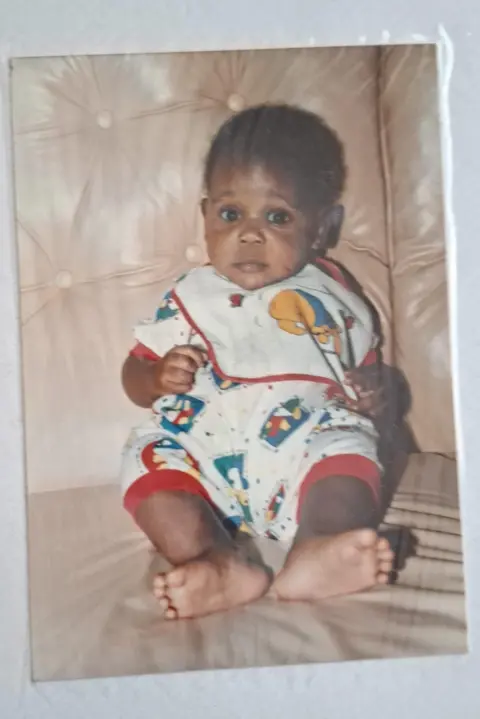 Thendo Muloiwa
Thendo MuloiwaSome archivists and futurists see this return to print as a way to counter a "digital dark age" - the idea that photos, videos and text might become unreadable as technology changes.
But Prof Winters thinks those claims are overblown, pointing to major international efforts to preserve more and more digital and online internet.
For many people, printing photos is more than just about documenting history.
Thendo says there is a particular joy people share when looking through a photo album together and chatting.
"You can't really do that on your phone," he tells me. "I mean, sure, you can open up your iCloud or whatever and scroll through all your photos, but you're going to find a lot of random pictures.
"As opposed to a photo album where you would have the perfect picture that you have picked and put in there - that's the difference."

 Getty Images
Getty ImagesA few minutes into using ChatGPT Atlas, the new internet browser from OpenAI, I ran into quite a big road block.
This isn't like Google Chrome, which is used by roughly 60% of people. It's all built around a chatbot you're meant to talk to to surf the web.
"Messages limit reached," read one note. "No available models support the tools in use," said another.
And then: "You've hit the free plan limit for GPT-5."
OpenAI says it will make using the internet easier and more efficient. A step closer to "a true super-assistant".
But assistants, super or not, don't come free - and the company needs to start making a lot more money from its 800 million users.
OpenAI says Atlas offers us an opportunity to "rethink what it means to use the web".
It looks somewhat similar to Chrome or Apple's Safari to begin with, apart from the big difference - a sidebar chatbot.

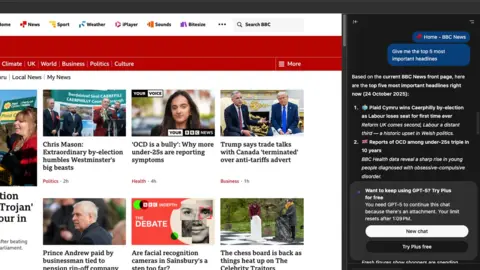 ChatGPT
ChatGPTOn a train booking website, it offered to "highlight deals" or compare prices with other places.
I asked it to book me a train, but was told this is only available for paying ChatGPT customers.
Later, I tried something simpler: I asked it to take me to an article I was reading the other day, but couldn't quite remember what website it was on.

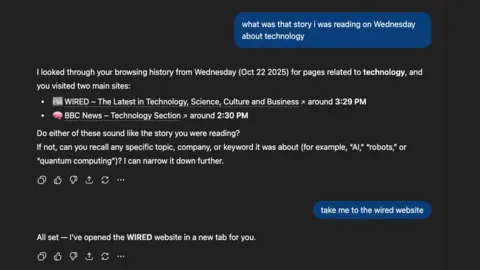 ChatGPT
ChatGPTThese are early days, but there's potential for big changes in how we use the internet.
What's clear is this will be a premium product which will only work to its full capacity if you pay a subscription fee.
Given we are so used to browsing the internet for free, this would require a lot of people to alter their habits quite dramatically.
OpenAI's founding mission was to reach artificial general intelligence - roughly meaning an AI which can match human intelligence.
So how does a browser help with that mission?
It doesn't, really. But it could raise some revenue.
The firm has convinced venture capitalists and investors to back it with billions of dollars - and at some point, it needs to start showing a return on that investment.
In other words, it needs to make money.

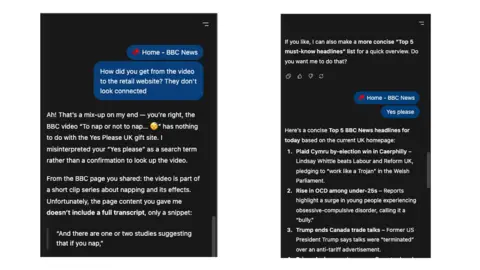 ChatGPT
ChatGPTBut raising money the internet's traditional way - advertising - might be a risk.
"OpenAI may be tempted to show ads to recoup costs and turn a profit, but it also must deliver a good user experience to stand out in a competitive market," said Stephanie Liu, a senior analyst at Forrester.
OpenAI will be hoping its users will find it so good they are willing to start paying - but only about 5% of ChatGPT users pay for a subscription, according to the Financial Times.
The other thing Atlas could do is give the firm access to a huge amount of user data.
These kinds of AI tools are ultimately about scale - the more data you feed them, the thinking goes, the better they will become.
The web is designed for humans to use, so if Atlas can monitor us - how we book train tickets for example - it can learn how to better navigate these kinds of processes.
"It remains to be seen how OpenAI will use users' data from Atlas, but for users who prefer anonymity and privacy, the browser may be too great of a risk," said Ms Liu.
Then we get to the competition.
Google Chrome is so dominant, authorities around the world have started raising eyebrows and words like "monopoly" are being thrown around.
It won't be easy to muscle into that market.
Google's Gemini AI is a part of the search engine now, while Microsoft has added Copilot into its Edge browser.
Back in the early days of ChatGPT, some dubbed it the "Google killer" - a game-changer which would make online search as we know it redundant.
That's not happened yet. But Erik Goins, founder of app developer Flywheel Studios, thinks it could.
He said Google built its business on "being the middleman between users and websites", whereas ChatGPT is "eliminating the middleman entirely".
"You don't search for 'hotels in Miami' and click through Google results anymore," he said.
"You just ask ChatGPT and it connects you directly."
Whether enough people are willing to pay for that little bit of extra convenience remains to be seen - and there's a long way to go before Google is toppled.


Sign up for our Tech Decoded newsletter to follow the world's top tech stories and trends. Outside the UK? Sign up here.

 Getty Images
Getty ImagesUS President Donald Trump has said he is increasing tariffs on goods imported from Canada after the province of Ontario aired an anti-tariff advertisement featuring former President Ronald Reagan.
In a post on social media on Saturday, Trump called the advert a "fraud" and lashed out at Canadian officials for not removing it ahead of the World Series baseball championship.
"Because of their serious misrepresentation of the facts, and hostile act, I am increasing the Tariff on Canada by 10% over and above what they are paying now," he wrote.
After Trump on Thursday withdrew from trade talks with Canada, the Ontario premier said he would take down the advert.
Ontario Premier Doug Ford said on Friday that he would pause his province's anti-tariff advertisement campaign in the US, telling reporters that he made the decision after discussions with Prime Minister Mark Carney "so that trade talks can resume".
He also said it would still run over the weekend, including during games for the World Series, which features the Toronto Blue Jays against the Los Angeles Dodgers.
Canada is the only G7 country that has not reached a deal with the US since Trump began seeking to charge steep tariffs on goods from major trading partners.
The US has already imposed a 35% levy on all Canadian goods - though most are exempt under an existing free trade agreement. It has also slapped sector-specific levies on Canadian goods, including a 50% levy on metals and 25% on automobiles.
In his post, sent while he was traveling to Asia, Trump seemed to say he was adding 10 percentage points to those taxes.
Three-quarters of Canadian exports are sold to the US, and Ontario is home to the bulk of Canada's automobile manufacturing.
The advert, which was sponsored by the Ontario government, quotes former US President Ronald Reagan, a Republican and icon of US conservatism, saying tariffs "hurt every American".
The video takes excerpts from a 1987 national radio address that focused on foreign trade.
The Ronald Reagan Foundation, which is charged with preserving the former president;s legacy, had criticised the advert for using "selective" audio and video and said it misrepresented Reagan's address. It also said the Ontario government had not sought permission to use it.
In his post on Truth Social on Saturday, Trump said that the advert should have been pulled down earlier.
"Their Advertisement was to be taken down, IMMEDIATELY, but they let it run last night during the World Series, knowing that it was a FRAUD," he wrote, while flying to Malaysia.
Ford had previously pledged to run the Reagan advert in every Republican-led district in the US.
The ad is not the only way that Ontario – home of the Toronto Blue Jays – is using the World Series as a platform to criticise Trump's tariffs.
In a video posted on Friday, Ford made several bets with California Governor Gavin Newsom about which team would win the series.
Both men repeatedly joked about tariffs in the video, with Ford pledging to send Newsom a can of maple syrup if the LA Dodgers win.
"The tariff might cost me a few extra bucks at the border these days, but it'll be worth it," he wrote.
In response, Newsom asked Ford to resume allowing American-produced alcohol to be sold in province liquor stores, and pledged to send "California's championship-worthy wine" if the Blue Jays triumph.
They ended their exchange both declaring: "Here's to a great World Series, and a tariff-free friendship between Ontario and California."
This breaking news story is being updated and more details will be published shortly. Please refresh the page for the fullest version.
You can receive Breaking News on a smartphone or tablet via the BBC News App. You can also follow @BBCBreaking on X to get the latest alerts.

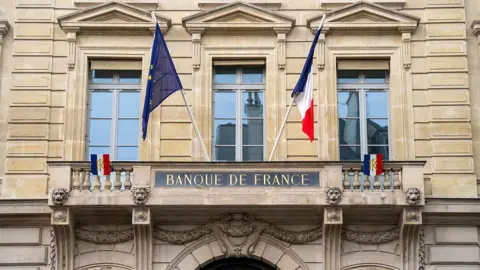 Getty Images
Getty ImagesThe Louvre has transferred some of its most precious jewels to the Bank of France after a spectacular daylight heist exposed woeful flaws in museum's security.
On Friday a secret police escort oversaw the transfer of some of the remaining jewels to the Bank, 500m (about 500 yards ) from the museum, French media report.
They will now be stored in the Bank's most secure vault, 26m (85ft) below the ground floor of its elegant headquarters in central Paris.
The vault is home to 90% of France's gold reserves, as well as the notebooks of Leonardo Da Vinci and other national treasures. Its contents are worth an estimated €600m (£520m).
The "Souterraine", as the vault is known, was designed to withstand all attacks, according to the bank's website.
The main shaft is protected by a 50cm-thick, seven-tonne door made of flame-resistant concrete and reinforced with steel.
Behind this door is a 35-tonne rotating concrete turret, which the bank says "prevents any possibility of forced entry".
Last Sunday, masked thieves used an angle grinder to smash through a reinforced window into the Louvre's Gallery of Apollo, where France's crown jewels are kept.
Within eight minutes, the gang seized treasures, including a necklace that belonged to Napoleon's wife Empress Marie-Louise and a diadem of Napoleon III's wife Empress Eugenie, worth €88m (£77m).
The thieves used a mechanical ladder on the back of a lorry to lift them to a first-floor balcony to gain entry to the gallery.
Interior Minister Laurent Nunez has said he has "every confidence" the thieves would be caught.
Although French ministers insist security at the museum had worked properly on the day, the Louvre director, Laurence des Cars, has spoken of weak and "aging" infrastructure.
On Wednesday, des Cars told French lawmakers that the sole security camera monitoring the exterior wall where the break-in took place was facing the wrong way.

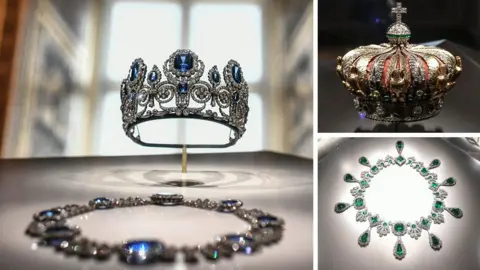 AFP via Getty Images
AFP via Getty Images
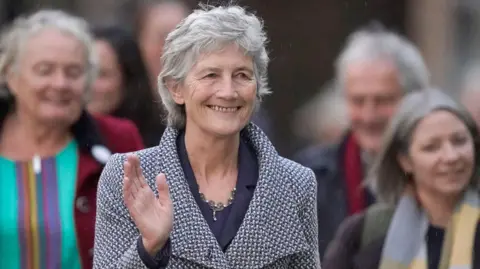 PA Media
PA MediaIndependent left-wing politician Catherine Connolly has been elected Ireland's 10th president after a landslide victory over her rival Heather Humphreys.
A seasoned politician and political performer, Connolly has been a TD (member of parliament) since 2016 for the Galway West constituency and also served as the Dail (Irish parliament) deputy speaker.
Connolly had the support of Ireland's major left-wing opposition parties, including Sinn Féin, the Irish Labour Party and the Social Democrats.
Seen very much as an anti-establishment candidate, in recent weeks the 68-year-old began insisting her campaign was a "movement".
She had been eyeing the presidency for a number of years and was the first candidate to announce she would run back in July.
To get on the ballot, a candidate must have the backing of 20 members of parliament or the backing of four city or county councils.
She already had more than the required 20 parliamentarian signatures even without the backing of Ireland's main opposition party Sinn Féin, whose campaigning machine weighed in behind her around halfway through.
She had only two competitors - Fine Gael's Heather Humphreys and Fianna Fail's Jim Gavin, candidates put forward by the two major parties in government.

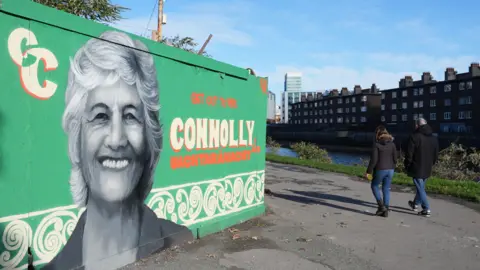 PA Media
PA MediaMr Gavin withdrew from the campaign earlier this month, but remained on the ballot securing 7.2% of the total poll in the end.
Connolly's composed debating style as well as a slick social media campaign garnered much praise and attention, particularly from younger voters.
She had a viral moment with a social media video of her doing keepie uppies with a football and taking on young people on the basketball court. Her impressive athletic attributes were viewed hundreds of thousands of times online.
Her main rival Humphreys failed to generate the same positive attention.
The biggest points of scrutiny levelled at Connolly throughout the campaign focused on her views on foreign policy and the Israel/Hamas conflict.
Connolly is an outspoken supporter of Palestine and frequently speaks about the "genocide" in Gaza and criticises "atrocities" committed by Israel.
Ireland is viewed internationally as being one of the most pro-Palestinian countries in Europe and Irish government ministers are often criticised as being antisemetic by Israeli politicians.
She sparked debate when she told BBC News NI during the campaign that Hamas was "part of the fabric" of Palestinian people.
Connolly has also been a critic of Nato and Fine Gael have hit out at her during the campaign for not being critical enough of Russia.
The head of state role in Ireland is mostly a ceremonial role and it is not executive. The president and the government are separate so they have no say in government policies.
Current president Michael D Higgins has often privately irked Irish ministers during his 14-year tenure by what has been perceived as criticism of government policy. He has been outspoken on Ireland's housing crisis and is also supportive of Palestine.
Connolly and Higgins have a history. Even though Connolly previously served as an Irish Labour councillor, she left the party after they did not add her as a running mate alongside Higgins on the Galway ticket.
Sinn Féin leader and opposition leader Mary Lou McDonald told BBC NI she believed Connolly would make the role her own.
"Catherine brings her authentic self to this role and I am not convinced that you ever have an Uachtarain [Irish president] that is simply a heat and repeat of a previous Uachtarain," she said at Dublin Castle.
Even though she is a Palestinian supporter and previously criticised the US and UK governments' roles in the conflict, Connolly told a TV debate last week she would not refuse to meet figures such as US President Donald Trump.
"If it's just a meet and greet, then I will meet and greet. If the discussion is genocide, then that's a completely different thing. But I doubt that will be the discussion with the president," she told the debate.
Connolly sought out to establish herself as a United Ireland candidate and said she would like to see it during her presidency, which runs for seven years.
She travelled to Northern Ireland during her campaign and her support of a United Ireland is believed to be one of the reasons she received Sinn Féin backing.
McDonald said Connolly appreciated "the preparation" for a United Ireland "needs to happen now" and that she would "exercise that soft power".
"This is an exciting time," she added.
"She's the right woman in the right place at the right time."
During the campaign, Connolly vowed to return a part of her presidential salary - which comes in at around €350,000 (£305,000).
Connolly said she would give back a "substantial" portion of the salary to projects.
Speaking after her win at Dublin Castle she vowed to be an "inclusive" president for all stating the Irish people can "shape a new Republic".
"I will be a president who listens and reflects and who speaks when it's necessary," she said.
"I will be a voice for peace, a voice that builds on our policy of neutrality, a voice that articulates the existential threat posed by climate change, and a voice that recognises the tremendous work being done the length and breadth of the country."
Police are continuing a manhunt for an asylum seeker who was mistakenly released from prison on Friday, weeks after being jailed for sexually assaulting a schoolgirl in Essex.
Ethiopian national Hadush Kebatu was meant to be sent to an immigration detention centre from HMP Chelmsford ahead of a planned deportation on Friday but Justice Secretary David Lammy said the 41-year-old is now "at large" in London.
Lammy said officers from the Metropolitan Police, British Transport Police (BTP) and Essex Police were working together to trace Kebatu, who was jailed for 12 months in September.
Sir Keir Starmer described the release as "totally unacceptable".
The prime minister said Kebatu "must be caught and deported for his crimes", adding that police are "working urgently to track him down".
Conservative Party leader Kemi Badenoch said the release was a "level of incompetence that beggars belief".
"Conservatives voted against Labour's prisoner release program because it was putting predators back on our streets," she said on X.

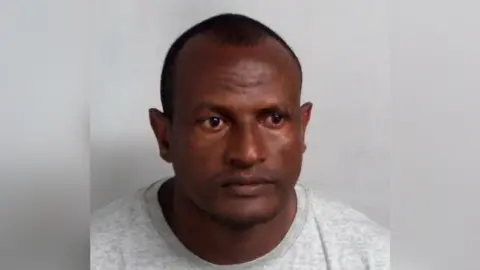 Essex Police
Essex PoliceThe Prison Service has removed an officer from discharging duties while an investigation takes place.
Essex Police said Kebatu boarded a London-bound train at Chelmsford station at 12:41 on Friday.
The force said it was informed by the prison services about "an error" at 12:57 on Friday.
A statement continued: "We understand the concern the public would have regarding this situation and can assure you we have officers working to urgently locate and detain him."
Lammy said he was "appalled" and "livid on behalf of the public".
He continued: "Let's be clear Kebatu committed a nasty sexual assault involving a young child and a woman. And for those reasons this of course is very serious."
A Prison Service spokesperson said: "We are urgently working with police to return an offender to custody following a release in error at HMP Chelmsford.
"Public protection is our top priority, and we have launched an investigation into this incident."
Kebatu's arrest in July sparked protests outside The Bell Hotel in Epping, where he had been living after arriving in the UK on a small boat.
In September, Chelmsford Magistrates' Court heard Kebatu tried to kiss a teenage girl on a bench and made numerous sexually explicit comments.
The following day, he encountered the same girl and tried to kiss her before sexually assaulting her. He also sexually assaulted a woman who had offered to help him draft a CV to find work.
During the trial, Kebatu gave his date of birth as December 1986, making him 38, but court records suggested he was 41.
He was found guilty of five offences and sentenced to 12 moths. He was also given a five-year sexual harm prevention order, which banned him from approaching or contacting any female, and ordered to sign the Sex Offenders Register for 10 years.
The court heard it was his "firm wish" to be deported.
Reform UK leader Nigel Farage said: "He is now walking the streets of Essex. Britain is broken."
A report from His Majesty's Prison and Probation Service said 262 prisoners in England and Wales were released in error between April 2024 and March 2025, up from 115 in the previous 12 months.

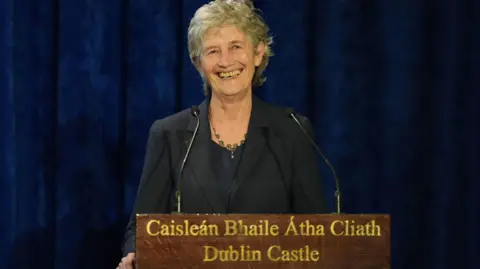 PA Media
PA MediaCatherine Connolly has been elected as the president of Ireland after a landslide victory.
She has become the 10th president of the Republic of Ireland after defeating Fine Gael's Heather Humphreys, who had already conceded to her rival.
The result, long clear from early tallies, was officially declared at Dublin Castle.
Connolly – an independent who was backed by the major left-wing parties – is taking over from Michael D Higgins who served the maximum two terms in office.
The 68-year-old, from Galway, has been a TD (member of the Irish parliament) since 2016 and previously worked as a psychologist and barrister.
She secured 914,143 first preference votes, the largest amount in Irish presidential election history.
Connolly, who made her acceptance speech first in Irish and then in English, pledged to be "an inclusive president for all".
"I will be a president who listens and reflects and who speaks when it's necessary," she said.
"I will be a voice for peace, a voice that builds on our policy of neutrality, a voice that articulates the existential threat posed by climate change, and a voice that recognises the tremendous work being done the length and breadth of the country."
When spoilt votes were excluded, Humphreys won 29% of first preference votes, while Fianna Fail's Jim Gavin, who withdrew from the race but remained on the ballot paper, won 7% first preference votes.
There were 213,738 spoiled votes, an unprecedented amount, and a turnout of 46%.

 Getty Images
Getty ImagesA suspect has been arrested after footage which appears to capture the alleged attempted rape of a woman on a train near Paris went viral, local media say.
Jhordana Dias, a 26-year-old Brazilian national, was allegedly attacked earlier this month. She told Le Parisien newspaper that the man boarded the train, pushed her and attempted to pull down her underwear.
Alerted by her screams, another passenger pulled out her phone to film. The footage captures a man fleeing as the train pulls into a station.
The incident has revived discussions around women's safety in France.
According to French media, a man was arrested on Friday evening by transport police in Mantes-la-Jolie, north-west of Paris. He was traced there by investigators, but it is unclear how.
He was not carrying identity documentation at the time of his arrest, but told police he was a 26-year-old Egyptian national, media reports say. He remains in custody.
The alleged incident took place on 15 October between the Choisy-le-Roi and Villeneuve-le-Roi train stations, south-east of Paris.
The video shows shows a man dressed in a black tracksuit and cap onboard a carriage.
Over the sound of a woman's cries, the woman filming can be hearing saying "you stay there" as the man appears to begin approaching her.
The train then pulls into a station, and the man disembarks and flees down the platform.
The woman who filmed the incident, named in French media only as Marguerite, has since been widely credited as having saved Ms Dias from a more serious attack.
Ms Dias, who does not speak French, reportedly filed a complaint with police in Choisy-le-Roi with the help of her brother, who translated her testimony.
The footage has been widely circulated on news outlets and social media. prompting many women to share their own experiences of harassment on public transport in France.
Two other women have since told Le Parisian that they had been victims of the same man.

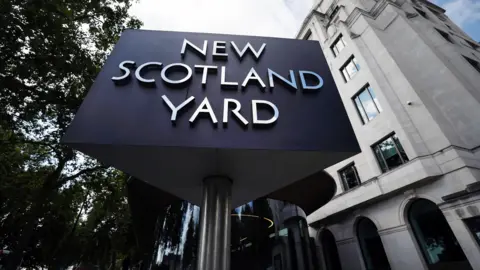 EPA
EPANine thousand cases of child sexual exploitation are being reviewed by the Metropolitan Police, the force has confirmed.
In a statement, the Met said it was reinvestigating the cases which involve "intra-familial, peer-on-peer and in institutional settings, along with those which do not fit the common understanding of a 'grooming gang'".
The cases are being re-examined following a national review into group-based child sexual exploitation which found it was more widespread, organised, and underreported than previously acknowledged.
The force said it took all "allegations or concerns about child sexual exploitation and child criminal exploitation incredibly seriously".
Baroness Casey's report, the National Audit on Group-based Child Sexual Exploitation and Abuse, also found a "mismatch" in the way the way the Metropolitan Police and local authorities record child abuse.
Published in June, it found the ethnicity of people involved had been "shied away from" by authorities.
On Saturday, Scotland Yard said group-based offending was "particularly insidious and devastating in its profound impact on the children affected".
In a statement, the force added: "Since 2022, there have been significant improvements to how the Met identifies and investigates group-based offending, including training for 11,000 frontline officers and the expansion of our child exploitation teams.
"In the last year we have solved three times more cases of child sexual exploitation – representing 134 more suspects charged.
"Our commitment to safeguarding all victims of such terrible offences and bringing those responsible to justice is absolute."
The cases the force is now reviewing cover a 15-year period, which the Met said was the same time period covered by Baroness Casey's report.
A spokesperson for Sir Sadiq Khan said the information had been published because "the mayor demanded full transparency and has consistently asked the Met to leave no stone unturned when investigating these appalling crimes".
The spokesperson added: "Any individuals or gangs exploiting children for sex are utterly abhorrent.
"Sadiq is quite clear that they must face the full force of the law.
"These children have not only suffered terrible abuse at the hands of the perpetrators but have been woefully let down by the authorities meant to protect them from harm."
Listen to the best of BBC Radio London on Sounds and follow BBC London on Facebook, X and Instagram. Send your story ideas to hello.bbclondon@bbc.co.uk

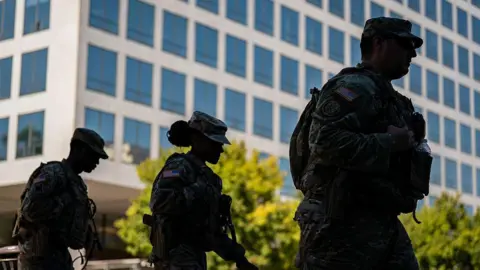 Getty Images
Getty ImagesAn unnamed donor is giving $130m (£100m) to the Pentagon to help pay US troops during the government shutdown, sparking ethics concerns.
US defence officials confirmed the gift, which President Donald Trump said will make up for shortfalls in paying the country's 1.32m service members, but declined to identify the donor.
Trump has provided a few clues, though, saying on Saturday "he's a big supporter of mine" and a US citizen.
The government shut down more than three weeks ago, after lawmakers failed to approve a funding deal. The Trump administration paid troops last week by shifting $8bn from military research, but it is unclear what will happen on the next payday at the end of the month.
Now in it's 25th day, the shutdown is poised to become one of the longest in US history.
"The donation was made on the condition that it be used to offset the cost of service members' salaries and benefits," Pentagon spokesman Sean Parnell told reporters on Friday, adding that the money was allowed under the department's "general gift acceptance authority."
Trump had previewed the donation on Thursday, while also declining to identify the donor, saying, "he doesn't really want the recognition".
Before leaving for Asia on Saturday, Trump told reporters at the White House that the donor is "a great gentleman", "a patron", a "patriot" and a "wonderful man" who "doesn't want publicity".
"He prefers that his name not be mentioned, which is pretty unusual in the world I come from," Trump said. "In the world of politics you want your name mentioned."
"He put up $130 million in order to make sure — that's a lot of money — in order to make sure that the military got paid, and he's a big supporter of mine," he continued.
The funds amount to around $100 per servicemember.
While the White House was able to reallocate defence funds to pay troops last week, it remains to be seen what will happen on the next payday for the military, on 31 October. Congress has been unable to pass a bill that would keep troops being paid during the shutdown.
Most government workers have been furloughed, or in some cases, told to work without pay while the shutdown lasts.
According to defence department rules, donations over $10,000 must be reviewed by ethics officials "to determine whether the donor is involved in any claims, procurement actions, litigation, or other particular matters involving the Department that must be considered prior to gift acceptance."
Donations from non-American citizens require additional scrutiny.
While unusual, the Pentagon does sometimes accept gifts from donors, but they normally must be given to fund specific projects, such as a school, hospital, library, museum, or cemetery.
Critics questioned why the US military would accept anonymous funds.
"Using anonymous donations to fund our military raises troubling questions of whether our own troops are at risk of literally being bought and paid for by foreign powers," said Delaware Senator Chris Coons, the top Democrat on the Senate's defense appropriations subcommittee.

 MHRA
MHRAThe first illicit production facility for weight loss medicine found in the UK has been dismantled.
The discovery, in Northampton, led to the largest single seizure of trafficked weight loss drugs ever recorded by a law enforcement agency worldwide, the Medicines and Healthcare Products Regulatory Agency (MHRA) said.
It said it seized tens of thousands of empty weight loss pens ready to be filled, raw chemical ingredients and more than 2,000 unlicensed Retatrutide and Tirzepatide pens due to be sent to customers.
Secretary of State for Health and Social Care, Wes Streeting, said: "This is a victory in the fight against the shameless criminals who are putting lives at risk.
"Don't line the pockets of criminals who don't care about your health."
The haul was estimated to be worth more than £250,000.

 MHRA
MHRAAlongside Northamptonshire Police, MHRA officers also found £20,000 in cash, suspected to be linked to medicines trafficking, and large amounts of sophisticated packaging and manufacturing equipment.
Andy Morling, head of MHRA's criminal enforcement unit, said people should be "extremely cautious" when buying medicines online and only get them from a registered pharmacy.
"These products are untested, unauthorised and potentially deadly," he said.
"By taking this organised criminal network out of operation and stopping tens of thousands of potentially fatal products from entering circulation, we've prevented a serious risk to public health.
"This is an illicit global market that endangers patients, puts big money in the pockets of organised criminals, and undermines legitimate healthcare."

 MHRA
MHRAFollow Northamptonshire news on BBC Sounds, Facebook, Instagram and X.

 Getty Images
Getty ImagesParents are being urged to get their children vaccinated against flu over half-term as the NHS warned of rising cases of the disease.
There is an early flu season, health officials say, and the latest data for England showed cases and hospitalisations were increasing.
NHS England said many school children will have already received the vaccine at school but there are still options for those who have not, including pop-up clinics.
GP surgeries can give flu vaccines to school-aged children and those with certain health conditions, as well as two to three year olds, while preschoolers can also be taken to pharmacies for the vaccine.
Most children are offered the vaccine in a nasal spray rather than an injection.
NHS England's weekly flu and Covid surveillance report said there was increased flu activity "particularly among children".
Duncan Burton, chief nursing officer for England, said it was concerning that the flu had hit early this year and the increase among children was "worrying".
"Flu can spread like wildfire across schools and can make children really unwell," he said.
"The virus changes each year, so vaccination remains the best way to shield your child from getting seriously ill."
He urged parents to make sure they had opted their child in for an in-school vaccine or find their nearest clinic.
Pop-up clinics were being held in places like bowling alleys and fire stations, Mr Burton told BBC Radio 4's Today programme, adding that the vaccine was "quick, easy and safe".
Dr Fari Ahmad told BBC Breakfast that while she was seeing cases, "I don't think we've quite hit the peak yet".
"With flu, this is a war we have every year. Flu is unpredictable, it still kills people and every year we try to get enough people vaccinated so that when the big surge comes we are not decimated," she said.
Dr Ahmad said that getting enough school-age children vaccinated meant that it made that surge better, "because they are spreaders".
"It will be great for the kids individually but it will also be better for all of us," she said.
NHS England said more than 10 million vaccines have already been delivered in the latest campaign, including to almost 1.5 million school-aged children and more than 300,000 eligible two and three year olds.
Free vaccines are available to those older than 65, with certain long-term health conditions, are pregnant, live in a care home, the main carer for an older or disabled person or live with someone who has a weakened immune system.

 Getty Images
Getty ImagesIt's been described as the mineral of the moment.
Millions of us are taking magnesium for a whole range of reasons. Can it help us sleep better? Sort our digestion problems? Give our busy brains a moment of peace?
In the fast-moving world of supplements, it's magnesium's time to shine.
And the industry is booming. The global magnesium market is worth nearly £3bn and that's set to nearly double over the next decade.
In a small factory, nestled in the Yorkshire Dales, huge plastic barrels of white powder are stacked up next to giant whirring machines.
Workers in hazmat suits carefully weigh out magnesium citrate - a compound made by mixing the mineral with citric acid - into shiny, steel containers.

 Ruth Clegg/BBC
Ruth Clegg/BBC"We are sending our supplies all over the world," Andrew Goring, manager director of Lonsdale Health, explains. "Around the UK, obviously, but also to Australia, parts of Asia, Kuwait, Iraq.
"It's one of our biggest sellers and the market just keeps growing."
He is shouting over the hum of the pill presser, a machine that resembles a Dalek, which pops out dozens of small white magnesium tablets a second.
"Do we actually need it?" I bellow back. "And why now, why has it become so popular?"
"Influencers, social media - that's what's pushing it," Mr Goring explains. "We've known about magnesium and its benefits for years and now, finally, it's mainstream."
I can almost hear the eye roll when I contact Kirsten Jackson, a dietitian who specialises in gut health.
"Clever marketing schemes," Ms Jackson says, "magnesium is involved in areas people are willing to invest in: their sleep, digestion, mental health."
But, she is keen to stress, this does not automatically mean we need supplements to improve those things.
Magnesium is one of several minerals in our bodies. The recommended daily amount for women is 270mg and for men, it's 300mg. We store about 25g.
It might make up less than 1% of us but "it is involved in over 300 different processes", Ms Jackson explains.
It is "especially important for our brain and mood," she says, because it helps nerves send messages properly and supports the building blocks of brain cell membranes.
It also helps balance blood sugar levels, regulate blood pressure, and is an essential player in moving calcium and potassium in and out of our cells, which maintains the rhythm of our heartbeat.
So, surely popping a pill full of the stuff should keep our bodies running smoothly?
It's more complex than that, says Ms Jackson. For a magnesium supplement to work, we need to be lacking the mineral in the first place - and it's difficult to test for any deficiency because the vast majority of our magnesium is stored in our bones and tissues.
But on an individual level, many say the supplement has made a difference.

 Katie Curran
Katie CurranFor Katie Curran, a communications specialist who has worked with some of the biggest fashion brands, sleeping well was something she could only dream about.
"A year ago, I was struggling," she confides. "It would take so long to get to sleep, my brain was racing, and then I would get off only to wake a couple of hours later."
Katie decided to try magnesium glycinate - a combination of magnesium and glycine, an amino acid with limited evidence linking it to better sleep.
After two weeks of taking 270mg a day, she says the noise in her head started to quieten. The racing thoughts slowed down, and she began to feel like she could function again.
"My sleep definitely improved, I had more energy. I became more active. Other things changed in my life, so I can't put it down to just one thing, but I think the magnesium supplements were an important part of the puzzle."
While being deficient in magnesium can definitely affect sleep patterns, there isn't the evidence to say taking supplements will definitely improve your sleep.
Social media is awash with eager supplement-takers, many with posts stamped with "commission paid" in the corner - meaning they could earn money from their story or reel.
According to these influencers, it feels as though there is little magnesium can't help with, as they recommend a variety of different products.
Magnesium is often mixed with other compounds with the aim of helping support various parts of our bodies. For example, magnesium mixed with either L-threonate or glycinate is supposed to target brain health, which helps with sleep and stress relief.
If magnesium is combined with chloride, it is recommended for muscle tension and pre-menstrual cramps, while citrate and oxide blends are aimed at digestion and help with constipation.
The majority of us can probably relate to having at least one of those issues. But as nutritionist Kristen Stavridis stresses, the problem is there is not enough strong evidence to show the majority of these different magnesium supplements have a positive effect on the healthy population.
And even if they did - we would need to be deficient in magnesium in the first place to see a benefit.
"We have supplement companies shouting out at us: 'We are all going to die'," Ms Stavridis says, "'Quick! Take my pill and - hey presto - there's your solution'.
"Many of us are not getting enough magnesium," she continues, "around 10% of men and 20% of women are not getting the recommended daily intake.
"But just taking a supplement is not the answer."

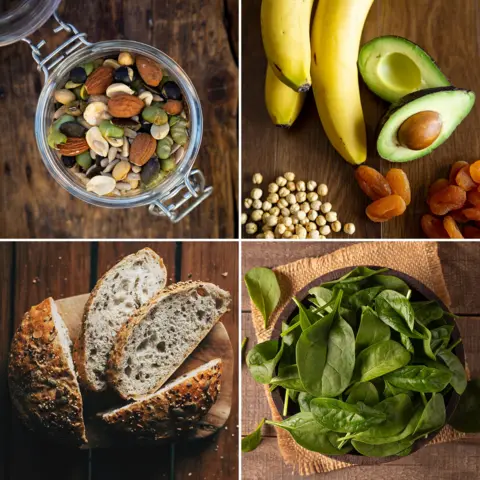 Getty Images
Getty ImagesTake sleep health, for example. Ms Stavridis says there are many conflicting studies on whether magnesium supplements really make a difference. Some trials say it can have some benefits, while some randomised controlled trials - the gold standard - are more sceptical.
There is also the added complication of supplements potentially working against each other because of the way they interact in the body.
Taking zinc, for example - a supplement often recommended for peri-menopausal women - can also affect the absorption rate of magnesium.
Basically, Ms Stavridis says, it's a minefield, and not just a simple case of "take this" and you'll be fixed.
She recommends looking at diet first. But if you are thinking about taking magnesium supplements, Ms Stavridis advises taking half the amount recommended on the packet on a daily basis and seeing how you feel.
If healthy people take too much, their kidneys can get rid of it in "expensive urine", but there are still risks, like diarrhoea, vomiting and nausea.
For those with kidney disease, taking magnesium supplements can be dangerous and can cause hypermagnesemia - a potentially life-threatening condition that can leave someone with paralysis or in a coma.
Dietitian Kirsten Jackson also says most people should "100% look at diet first".
Foods like seeds, nuts, whole-grain breads, greens and fruit are good sources of magnesium, she says.
She warns that if you don't regularly consume these types of foods, you're probably also short of other essential nutrients like vitamin C, vitamin K, fibre and prebiotics too.
"One magnesium supplement is not going to sort all that."

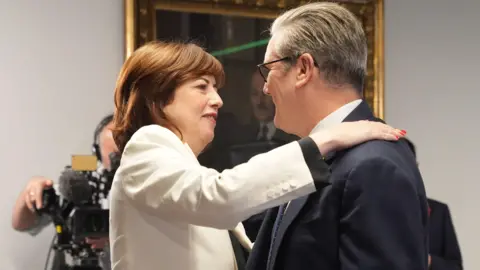 PA Media
PA MediaSaturday morning in a back street in south London - and I am leaning on a metal railing.
I am outside the Labour Party's headquarters, and this is as close to the announcement of the party's new deputy leader as I am going to get.
This was a contest Labour did not want and its outcome was so underplayed us reporters were not even let in to watch it.
Thankfully, after a bit of to and fro, they did let a few broadcast cameras in so we could watch outside and you could watch too, if you chose to.
Seven weeks ago the prime minister sacked Lucy Powell from his cabinet.
Today she became his deputy leader of the Labour Party.
Politics is a funny old business.
When Angela Rayner resigned Sir Keir Starmer used the moment to embark on a pretty widespread reshuffle of his ministerial team.
The most high profile casualty? Powell.
A month and a bit later she is back.
Not back in government, but back in a directly elected senior role within the party.
But while this is not the result of this contest Sir Keir would have preferred, it is worth briefly dwelling on the numbers in this election.
While Powell was the favourite once this race was down to two candidates and she was the clear victor, it was not a landslide.
It was not a wholesale, overwhelming rejection of Bridget Phillipson, who was seen as the candidate closer to the prime minister as a serving cabinet minister.
After the result, us reporters were still loitering in the street and we were kept waiting ages for the winner, the loser and the prime minister to leave.
Word then came as to at least one of the reasons why - the prime minister and the new deputy leader of the Labour Party were meeting.
Hedgehog diplomacy perhaps? A little spiky?
At least awkward, up to a point, surely.
That said, the expectation from some that Powell will be shooting her mouth off or frequently public disloyal is overdone.
After all, she was in government until just last month - and told me her observations and critiques will mainly be articulated privately.
Let's see.
Taking a step back from all this today, Labour is a party that knows it is currently losing - losing elections, losing attention, often losing the argument.
Powell's election is an expression of that fret.
Just think of the rows and bungles of the last seven weeks.
Rayner, Lord Mandelson. Asylum seekers. The China spy case row. The Caerphilly by-election, just for starters.
I asked Powell if things are rescuable – for the country, the government, her party.
Yes, she insisted.
Whether she is right will be the determining factor in the fate of this government.


Sign up for our Politics Essential newsletter to keep up with the inner workings of Westminster and beyond.
Former US Vice-President Kamala Harris has told the BBC she may run again for the White House.
In her first UK interview, Harris said she would "possibly" be president one day and was confident there will be a woman in the White House in future.
Making her strongest suggestion to date that she will make another presidential bid in 2028 after losing to Donald Trump last year, Harris dismissed polls that put her as an outsider to become the Democrats' pick for the next election.
Speaking to Sunday with Laura Kuenssberg, Harris also turned her fire on her former rival, branding Trump a "tyrant", and said warnings she made about him on the campaign trail had been proved right.

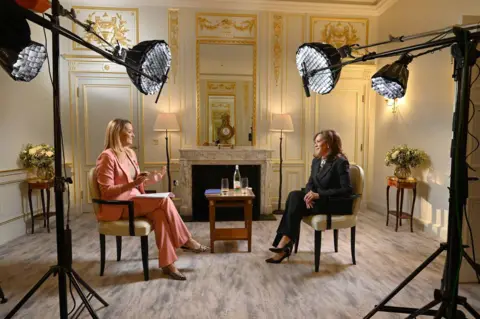
As the Democratic party searches for answers about Republican Donald Trump's decisive victory one year ago, much of the blame has been directed at former President Joe Biden for not standing down sooner.
But there have also been questions raised about whether Harris could have run a better campaign and set out a clearer message on the number one issue, the economy.
In the BBC interview Harris entertained the prospect of another run at the White House, saying her grandnieces would, "in their lifetime, for sure", see a female president.
Asked if it would be her, she said, "possibly", confirming she is considering another run at the top job.
Harris said she had not yet made a decision, but underlined that she still sees herself as having a future in politics.
"I am not done," the former vice-president said. "I have lived my entire career as a life of service and it's in my bones."
Responding to odds that place her as an outsider to win a place on the Democratic ticket - even behind Hollywood actor Dwayne the Rock Johnson - she said she never listened to polls.
"If I listened to polls I would have not run for my first office, or my second office - and I certainly wouldn't be sitting here."


Harris also said she believed predictions she made about Donald Trump behaving as a fascist and running an authoritarian government had come true.
"He said he would weaponise the Department of Justice - and he has done exactly that."
She pointed to the suspension of late-night comic Jimmy Kimmel by ABC after he made a joke about Republican reaction to the death of right-wing influencer Charlie Kirk.
His removal from the airwaves, celebrated by Trump, came after the Trump-appointed regulator threatened Kimmel's broadcasters.
"You look at what has happened in terms of how he has weaponised, for example, federal agencies going around after political satirists… His skin is so thin he couldn't endure criticism from a joke, and attempted to shut down an entire media organisation in the process."

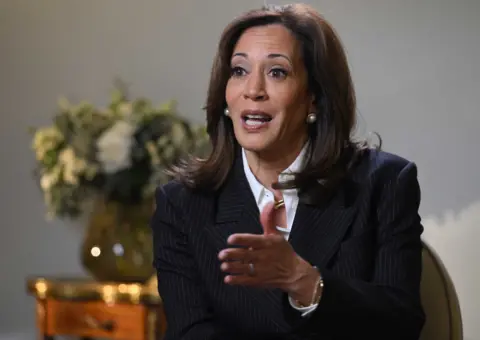
Harris also slammed business leaders and institutions in America who have, in her view, too easily bowed to the president's demands.
"There are many… that have capitulated since day one, who are bending the knee at the foot of a tyrant, I believe for many reasons, including they want to be next to power, because they want to perhaps have a merger approved or avoid an investigation."
The White House was dismissive when asked for a response to Harris's comments about the president.
"When Kamala Harris lost the election in a landslide, she should've taken the hint - the American people don't care about her absurd lies," said spokeswoman Abigail Jackson.
"Or maybe she did take the hint and that's why she's continuing to air her grievances to foreign publications."
Harris has just published her account of her rollercoaster campaign, 107 Days, the time that was left to her to run for the presidency after Biden withdrew from the race following months of speculation about his mental acuity.
In our full interview with the former vice-president, to be broadcast in the UK on Sunday at 09:00 GMT (05:00 EST), I pressed Harris several times on whether she ought to have urged Biden to make way for her sooner.
How much did she really know about his health? And a question that may haunt her - whether she would be president now, not Donald Trump, if Biden had withdrawn earlier?
The answer is plainly, unknowable - the great "if" that could have changed the fate of America.

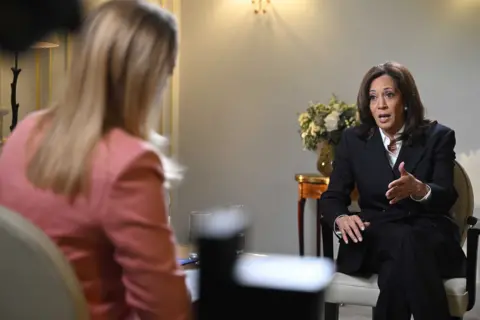
Among the Democratic soul-searching, Harris' candidacy is often disparaged, her weaknesses as a leader pinpointed as the reasons for her defeat, not just the last-minute nature of Biden's decision.
When questioned about what went wrong, rather than plunge into deep analysis, her contention is because she started so late, it was almost impossible to win.
But having sat down with the Californian former prosecutor in the gilded surroundings of a luxury London hotel - rather than the increasingly golden surroundings of the Oval Office as Donald Trump glitzes up the decor - the possibility of power is something she is not willing to leave behind.
Previous hints of her future presidential ambition seemed coy, non-committal - "maybe, maybe not", or "I'm not focusing on that right now".
Her candour in our conversation was more striking. She was quick, eager even, to put herself in the frame for another tilt at power. But she stopped short of making any concrete commitment.
That may be surprising given the thoroughly bruising nature of a defeat she has described as traumatising. She and her team were devastated by the defeat, which came as a surprise to them.
"My god, my god, what will happen to our country?" Harris says she repeated when the result came through.


Her attempt to explain it focuses on how narrow the gap in actual votes was between her and Trump.
The popular vote was, indeed, very tight, with less than 2% in it. However, Harris was trounced by Trump in the all-important electoral college, where each state has a certain number of votes that tally up.
Harris was willing to drop heavy hints about her own future. But there's less willingness from her, or frankly any other senior Democrats, grappling with their party's long-term dilemmas.
How does a centre-left party with mainstream leaders take on a right-wing populist leader? Is the answer to focus on Trump? Or is it to argue more forcefully for Main Street?

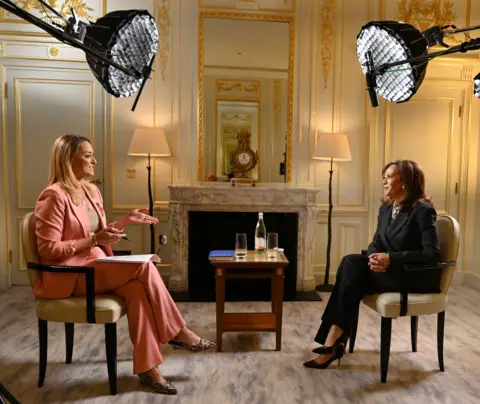
When I challenged the former vice-president on why her campaign did not better connect with working people, she said she needed more time to do that, and pointed to a longstanding drift away from her party among that group.
She regrets she didn't have long enough in 2024 to make her own pitch on bread- and-butter issues like housing, or childcare.
But if she had longer next time round, it's far from guaranteed her arguments would be more compelling, or more gladly received.
Kamala Harris still travels with the trappings of an entourage. Aides anxiously watch the clock as her every minute is planned with military precision. Non-stop travel, choreographed events in different capitals, a tiny number of carefully planned TV interviews.
This time, Harris is on the move for a book tour, not a presidential race. But maybe, if she has her way, this is the start of another campaign after all.
The full interview will be broadcast on Sunday with Laura Kuenssberg at 0900 on Sunday 26 Oct 2025.
Pictures: Jeff Overs/BBC


Sign up for the Off Air with Laura K newsletter to get Laura Kuenssberg's expert political insight and insider stories every Thursday.

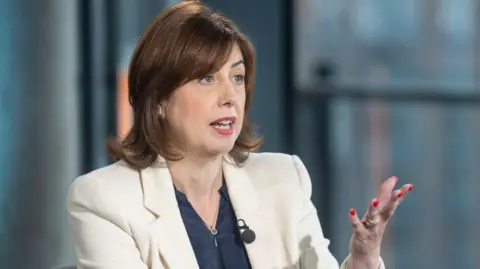 PA Media
PA MediaLucy Powell has been elected as Labour's new deputy leader after a race triggered by Angela Rayner's resignation last month.
The Manchester Central MP defeated Education Secretary Bridget Phillipson by promising to give grassroots members a louder voice and push for a "course correction" in government.
She was sacked from the cabinet in September and drew support from members who are dissatisfied with the direction of the government under Sir Keir Starmer's leadership.
Powell took 87,407 votes, comfortably beating Phillipson on 73,536, with a turnout of 16.6%.
The race began with six candidates but the field was quickly reduced to two, with Phillipson widely seen as the leadership's choice.
It was triggered by Rayner's dramatic resignation after admitting to underpaying tax on a house purchase.
While relations between Sir Keir and Rayner had been tense at times, she was a key figure in the government.
She held the title deputy prime minister and was seen as a political bridge between the leadership and the party's traditional working class and union base.
But last month's reshuffle left the deputy leadership as a purely party role after Sir Keir appointed David Lammy as deputy prime minister and placed key allies in other cabinet roles.
Unlike the cabinet, the deputy leader of the Labour Party is elected by members, not appointed by the prime minister.
Powell will sit on Labour's powerful National Executive Committee and act as the party's "campaigner-in-chief."


Sign up for our Politics Essential newsletter to keep up with the inner workings of Westminster and beyond.
Police are continuing a manhunt for an asylum seeker who was mistakenly released from prison on Friday, weeks after being jailed for sexually assaulting a schoolgirl in Essex.
Ethiopian national Hadush Kebatu was meant to be sent to an immigration detention centre from HMP Chelmsford ahead of a planned deportation on Friday but Justice Secretary David Lammy said the 41-year-old is now "at large" in London.
Lammy said officers from the Metropolitan Police, British Transport Police (BTP) and Essex Police were working together to trace Kebatu, who was jailed for 12 months in September.
Sir Keir Starmer described the release as "totally unacceptable".
The prime minister said Kebatu "must be caught and deported for his crimes", adding that police are "working urgently to track him down".
Conservative Party leader Kemi Badenoch said the release was a "level of incompetence that beggars belief".
"Conservatives voted against Labour's prisoner release program because it was putting predators back on our streets," she said on X.

 Essex Police
Essex PoliceThe Prison Service has removed an officer from discharging duties while an investigation takes place.
Essex Police said Kebatu boarded a London-bound train at Chelmsford station at 12:41 on Friday.
The force said it was informed by the prison services about "an error" at 12:57 on Friday.
A statement continued: "We understand the concern the public would have regarding this situation and can assure you we have officers working to urgently locate and detain him."
Lammy said he was "appalled" and "livid on behalf of the public".
He continued: "Let's be clear Kebatu committed a nasty sexual assault involving a young child and a woman. And for those reasons this of course is very serious."
A Prison Service spokesperson said: "We are urgently working with police to return an offender to custody following a release in error at HMP Chelmsford.
"Public protection is our top priority, and we have launched an investigation into this incident."
Kebatu's arrest in July sparked protests outside The Bell Hotel in Epping, where he had been living after arriving in the UK on a small boat.
In September, Chelmsford Magistrates' Court heard Kebatu tried to kiss a teenage girl on a bench and made numerous sexually explicit comments.
The following day, he encountered the same girl and tried to kiss her before sexually assaulting her. He also sexually assaulted a woman who had offered to help him draft a CV to find work.
During the trial, Kebatu gave his date of birth as December 1986, making him 38, but court records suggested he was 41.
He was found guilty of five offences and sentenced to 12 moths. He was also given a five-year sexual harm prevention order, which banned him from approaching or contacting any female, and ordered to sign the Sex Offenders Register for 10 years.
The court heard it was his "firm wish" to be deported.
Reform UK leader Nigel Farage said: "He is now walking the streets of Essex. Britain is broken."
A report from His Majesty's Prison and Probation Service said 262 prisoners in England and Wales were released in error between April 2024 and March 2025, up from 115 in the previous 12 months.